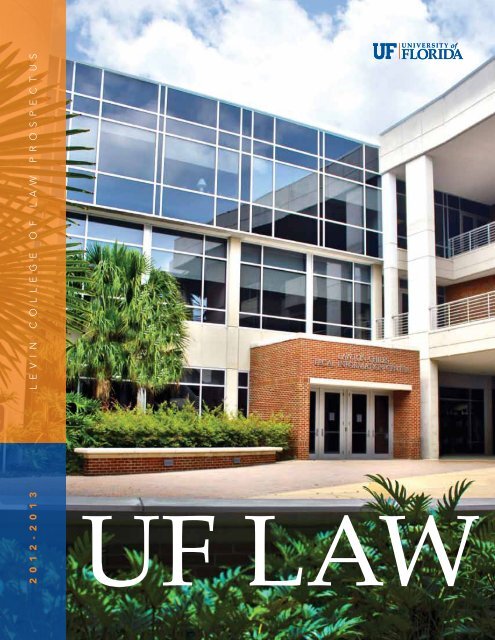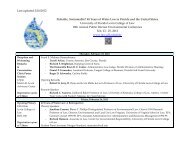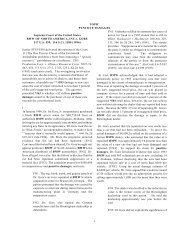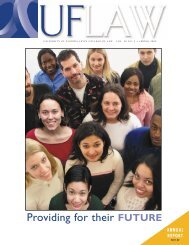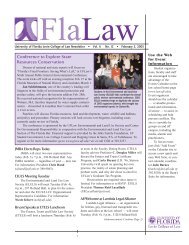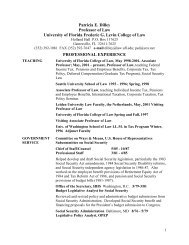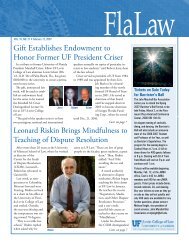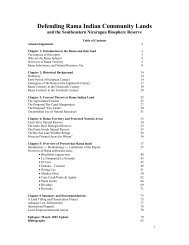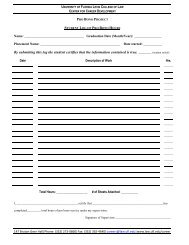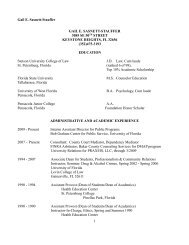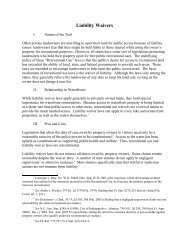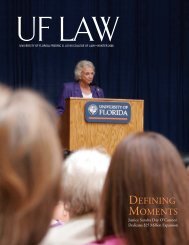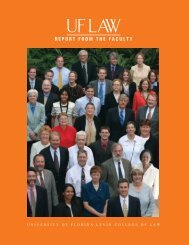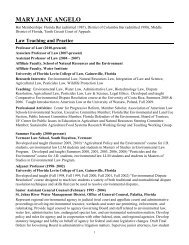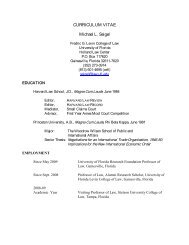2012-2013 Prospectus - Levin College of Law - University of Florida
2012-2013 Prospectus - Levin College of Law - University of Florida
2012-2013 Prospectus - Levin College of Law - University of Florida
Create successful ePaper yourself
Turn your PDF publications into a flip-book with our unique Google optimized e-Paper software.
Virtual Tour. Scan the QRcode with your mobiledevice to take a virtual tour<strong>of</strong> the <strong>Levin</strong> <strong>College</strong> <strong>of</strong> <strong>Law</strong>campus. (To download app,visit www.mobile-barcodes.com/qr-code-s<strong>of</strong>tware/.)<strong>Prospectus</strong> 3
Your Future.At the <strong>Levin</strong> <strong>College</strong> <strong>of</strong> <strong>Law</strong> we nurture futureleaders and elite pr<strong>of</strong>essionals for the legal worldand beyond. Our mission statement explains how:Exceptional faculty, staff and students are committedto “excellence in educating pr<strong>of</strong>essionals, advancinglegal scholarship, serving the public, and fosteringjustice. We aspire to prepare lawyers to serve theirclients, the justice system, and the public with a highlevel <strong>of</strong> accomplishment and a commitment to thehighest ideals <strong>of</strong> the legal pr<strong>of</strong>ession.”“You will find a stimulating intellectual environment herethat nurtures who you are now and the type <strong>of</strong> pr<strong>of</strong>essionalyou want to become. You will acquire the foundationyou need to practice at the highest level <strong>of</strong> competency,and you will begin to tackle fundamental questions relatedto justice, service and the rule <strong>of</strong> law. A great many <strong>of</strong>our alumni have reached the highest levels <strong>of</strong> pr<strong>of</strong>essionalaccomplishment and I can assure you they deeply valuetheir law degrees from the <strong>University</strong> <strong>of</strong> <strong>Florida</strong>.”—DEAN ROBERT JERRY II <strong>Levin</strong>, Mabie & <strong>Levin</strong> Pr<strong>of</strong>essor <strong>of</strong> <strong>Law</strong>4 UF <strong>Law</strong>
Students.Thirty-eight students enrolled in 1909, UF <strong>College</strong> <strong>of</strong><strong>Law</strong>’s first year in operation. The college consisted <strong>of</strong>one building and admission requirements included atleast two years <strong>of</strong> high school. Over the course <strong>of</strong> morethan a century, UF <strong>Law</strong> has produced more than half<strong>of</strong> the leaders <strong>of</strong> The <strong>Florida</strong> Bar and five American BarAssociation presidents since 1973. Meanwhile, it hasgrown into a top-tier law school where U.S. SupremeCourt justices and other legal luminaries appear regularlyto talk with the 1,100 students that enjoy state-<strong>of</strong>theart facilities, many new or renovated since 2005.“As far as I could remember I wanted to be a lawyer andas far as I can remember the only law school and the onlyschool I ever wanted to go to was the <strong>University</strong> <strong>of</strong> <strong>Florida</strong>,and it was not because the Gators were a great footballteam. There’s something special about the education thatwe get here and the contacts that we make while we’re hereand that we make with other alumni upon graduating. Ican’t think <strong>of</strong> a better place to go to law school.”—JORGE LABARGA (JD 79) Justice <strong>of</strong> the <strong>Florida</strong> Supreme Court6 UF <strong>Law</strong>
In 2011, The <strong>Florida</strong> Tax Moot Court Team,seen here with advisor and UF <strong>Law</strong> Pr<strong>of</strong>essorSteven Willis at right, won the National TaxMoot Court competition held in St. Petersburg,Fla., after finishing second the year before.First-rate Qualifications.• The student body during the 2011-<strong>2012</strong>academic year was comprised <strong>of</strong> 1,098students, 976 <strong>of</strong> whom are J.D. studentsfrom throughout the Southeast and thenation.• Thirty-four students are earning jointJ.D./master’s or Ph.D. degrees.• Two hundred and ninety-one students inthe 2011 fall entering J.D. class.• One hundred and twenty-two studentsare enrolled in LL.M. and S.J.D. programs.The nine students in UF <strong>Law</strong>’s LL.M. inComparative <strong>Law</strong> Program hail fromcountries including South Africa, China,Saudi Arabia, Brazil and Argentina.• Of the combined 2011-<strong>2012</strong> studentbody, 25 percent were minorities: 11percent Hispanic, 6 percent African-American, 5 percent Asian-Americanand 1 percent Native-American/Alaskan.• The student body consisted <strong>of</strong> 56 percentmen and 44 percent women.• Students enrolled at the <strong>Levin</strong> <strong>College</strong><strong>of</strong> <strong>Law</strong> have undergraduate degreesrepresenting more than 70 institutions,including American <strong>University</strong>,Boston <strong>College</strong>, Cornell, Duke, Emory,Georgetown, Princeton, Texas A&M,<strong>University</strong> <strong>of</strong> Alabama, <strong>University</strong> <strong>of</strong>California, Los Angeles, <strong>University</strong> <strong>of</strong><strong>Florida</strong>, <strong>University</strong> <strong>of</strong> Michigan – AnnArbor, <strong>University</strong> <strong>of</strong> North Carolina– Chapel Hill, <strong>University</strong> <strong>of</strong> NotreDame, <strong>University</strong> <strong>of</strong> Texas – Austin,<strong>University</strong> <strong>of</strong> Virginia, <strong>University</strong> <strong>of</strong>Wisconsin, Washington <strong>University</strong>,and Vanderbilt.• Many students come directly fromearning a bachelor’s degree, while othershave experience in the workingworld including the fields <strong>of</strong> accounting,business and finance, education,journalism, sales and marketing, s<strong>of</strong>twaredevelopment and urban planning.Graduates consistently outpacethe rest <strong>of</strong> the state on the bar exam.<strong>Prospectus</strong> 7
Alumni.The accomplishments, involvement and support<strong>of</strong> UF <strong>Law</strong> alumni distinguish them as one <strong>of</strong> themost powerful alumni networks in the nation.More than 22,000 alumni have graduated since thecollege’s founding, representing UF throughout<strong>Florida</strong>, the nation and worldwide. Among themare more American Bar Association presidents thanthose from any other law school in the past 30 years,dozens <strong>of</strong> state and federal judges and lawmakers,<strong>Florida</strong> governors, and nationally prominentlawyers, executives and academics.“I will tell you why you should go to law school.You go to law school because a law degree is one<strong>of</strong> the most powerful weapons on Earth because itgives you the power to right a wrong and who elsebut a lawyer can look at an injustice and do somethingabout it. I hope you can follow your dream.”—STEPHEN N. ZACK (JD 71), American Bar Association President 2010-2011 and UF <strong>Law</strong> graduate10 UF <strong>Law</strong>
Four consecutive Gators lead The<strong>Florida</strong> Bar, the nation’s secondlargest bar. From left are GwynneYoung (JD 74), Scott Hawkins (JD 83),Eugene K. Pettis (JD 85), ExecutiveDirector John F. “Jack” Harkness (JD69) and Mayanne Downs (JD 87).Meet the Gator Nation• Five alumni have served as American BarAssociation presidents since 1973; that’smore than any other law school during thesame period.• UF <strong>Law</strong> is ranked fourth among public lawschools (tied for seventh overall) for thenumber <strong>of</strong> degrees granted to sitting federaljudges as <strong>of</strong> <strong>2012</strong>, according to FederalJudicial Center data.• Eighteen <strong>Levin</strong> <strong>College</strong> <strong>of</strong> <strong>Law</strong> alumni haveserved on the <strong>Florida</strong> Supreme Court.• Four graduates have served as governors<strong>of</strong> <strong>Florida</strong>. Hundreds more have servedas state senators and representatives,president <strong>of</strong> the Senate and speaker <strong>of</strong>the House, including the current HouseSpeaker Dean Cannon (JD 92), as well asin the <strong>Florida</strong> Cabinet.• Eleven graduates became presidents <strong>of</strong>colleges, including <strong>University</strong> <strong>of</strong> <strong>Florida</strong>.• Thirteen graduates have served asdeans <strong>of</strong> law schools, including threewho led their alma mater.• Since The <strong>Florida</strong> Bar’s inception in 1950,the majority <strong>of</strong> its presidents, includingfour in a row starting in 2010, have been<strong>Levin</strong> <strong>College</strong> <strong>of</strong> <strong>Law</strong> graduates.<strong>Prospectus</strong> 11
Leadership.UF <strong>Law</strong> alumni lead the nation as legislators,members <strong>of</strong> Congress, public servants andfederal, state and county judges. And it’s nocoincidence that so many presidents <strong>of</strong> The<strong>Florida</strong> Bar and the American Bar Associationcall themselves Gators. Successful graduatesgive back time and money to UF <strong>Law</strong>, whichimproves the education for future graduates andhas built the largest endowment in the state.“In addition to receiving an excellent legal education, I metsome great people who went on to make a difference in ourstate. Many <strong>of</strong> them helped me in my judicial career. I neverwould have achieved my goal <strong>of</strong> becoming a federal judge butfor the legal training at the <strong>University</strong> <strong>of</strong> <strong>Florida</strong>.”—STEPHAN P. MICKLE (JD 70), chief judge, U.S. District Court, Northern District <strong>of</strong> <strong>Florida</strong>Strength on the Bench.• When considering the characteristics<strong>of</strong> a good judge, “loyalty tothe law,” “wisdom,” “fidelity” and“integrity” spring to mind. Theseare the attributes society seeks inits judges and magistrates.• As the alma mater <strong>of</strong> hundreds <strong>of</strong>federal, state and county judges,the <strong>Levin</strong> <strong>College</strong> <strong>of</strong> <strong>Law</strong> takesenormous pride in the accomplishmentsand wisdom <strong>of</strong> itsgraduates serving on the bench.Not only do these individualsdedicate their lives in service tosociety, they also serve on thejudging panels <strong>of</strong> trial team andmoot court competitions to educatethe next generation <strong>of</strong> UFlawyers in the subtleties <strong>of</strong> oraladvocacy.• Alumni judges collaborated toestablish the Peter T. Fay Jurist-In-Residence Program at the<strong>Levin</strong> <strong>College</strong> <strong>of</strong> <strong>Law</strong> in honor<strong>of</strong> the Hon. Peter T. Fay (JD 56),senior judge on the U.S. 11thCircuit Court <strong>of</strong> Appeals. The12 UF <strong>Law</strong>
Director <strong>of</strong> the White House Office <strong>of</strong> Energyand Climate Change Policy Carol Browner(JD 79) speaks during a briefing in the BradyBriefing Room <strong>of</strong> the White House in <strong>of</strong> theWhite House in Washington. (Getty Images)Jurist-In-Residence Program bringsa working judge to the <strong>Levin</strong> <strong>College</strong><strong>of</strong> <strong>Law</strong> campus for a week each yearto interact with and instruct <strong>Levin</strong><strong>College</strong> <strong>of</strong> <strong>Law</strong> students. Throughthis interaction, students gain firsthandinstruction on a broad array<strong>of</strong> issues relating to judicial process,substantive law, trial and appellateadvocacy, and the day-to-day practice<strong>of</strong> law.• Stephan P. Mickle is among thosewho graduated from UF <strong>Law</strong> andwent on to distinguished judicialcareers. The first African-Americanto earn a bachelor’s degree from the<strong>University</strong> <strong>of</strong> <strong>Florida</strong> in 1965, hethen earned his master’s degree followedby a law degree from UF <strong>Law</strong>and would eventually become thefirst African-American federal judgefor the Northern District <strong>of</strong> <strong>Florida</strong>.Strength in the Government.• Carol M. Browner (JD 79), the longestserving administrator <strong>of</strong> theEnvironmental Protection Agency,most recently served as PresidentBarack Obama’s director <strong>of</strong> theWhite House Office <strong>of</strong> Energy andClimate Change.• John H. Hankinson Jr. (JD 79) is atthe heart <strong>of</strong> efforts to recover fromthe Gulf oil spill as executive director<strong>of</strong> the EPA’s Gulf Coast EcosystemRestoration Task Force.• Esther Olavarria (JD 86) is deputyassistant secretary for policy in theDepartment <strong>of</strong> Homeland Security• Osvaldo Luis Gratacós (JD 00) isinspector general <strong>of</strong> the Export ImportBank <strong>of</strong> the United States.<strong>Prospectus</strong> 13
Gator Nation.Students benefit from interaction with distinguishedalumni, who get involved in mentoring and externshipprograms and as guest lecturers and symposiaspeakers on campus. Alumni at the <strong>Levin</strong> <strong>College</strong> <strong>of</strong><strong>Law</strong> are leaders in the legal pr<strong>of</strong>ession, the judiciary,business, government, public service and educationat state, national and international levels. Each year,these legal pr<strong>of</strong>essionals are cited as the nation’s bestin publications such as The National <strong>Law</strong> Journal andBest <strong>Law</strong>yers in America as they make their mark onsociety and the legal pr<strong>of</strong>ession.“At Holland & Knight we go for the best <strong>of</strong> thebest. We are looking for mature, practice-readyyoung lawyers who can immediately deliverclient services in a thoughtful way. We believein their pr<strong>of</strong>essionalism, and we know the valuesthat are instilled in them at UF <strong>Law</strong>. As analumna, I know the value <strong>of</strong> the Gator Nation.”—MARTHA BARNETT (JD 73), Holland & Knight seniorpartner and former chairwoman; past president <strong>of</strong> theAmerican Bar Association, 2000-200114 UF <strong>Law</strong>
UF <strong>Law</strong> summer interns, Brandon Whiteand Erica Perdomo, flank U.S. DistrictJudge Paul C. Huck (JD 65). Huck, whoserves on the UF <strong>Law</strong> Board <strong>of</strong> Trustees,is among many active alumni who devotetime to mentoring UF <strong>Law</strong> students.Strong Alumni Ties.• While most <strong>Levin</strong> <strong>College</strong> <strong>of</strong> <strong>Law</strong> alumni practice withlaw firms throughout <strong>Florida</strong> and the nation, many alsoserve as counsel to government agencies, corporationsand a wide array <strong>of</strong> public service organizations.• Strong alumni ties in these areas <strong>of</strong> the law provide excellentinternship and externship and clerking opportunitiesfor UF <strong>Law</strong> students. In addition, <strong>Levin</strong> <strong>College</strong> <strong>of</strong> <strong>Law</strong>alumni play a key role in the provision <strong>of</strong> quality and affordablelegal education at UF, mentoring students andsharing their areas <strong>of</strong> expertise as adjunct instructors,guest speakers, jurists in residence, journal advisors, andas coaches for trial team.<strong>Prospectus</strong> 15
The Center for Career Development’s pr<strong>of</strong>essionalcounselors — all with J.D.s and practical legal experience— <strong>of</strong>fer a wide variety <strong>of</strong> resources and programs.Beginning in the first year <strong>of</strong> law school, students gethelp developing their pr<strong>of</strong>essional identities, planningtheir career searches and establishing marketing techniquesthat will serve them throughout their careers.Career.Resources include:• Workshops on practical careerskills, from polishing a resume to“working a room” to handling callbackinterviews as well as seminarson career path exploration andbecoming a successful pr<strong>of</strong>essional.• Individual counseling to formulatea career path and determineappropriate job-search strategies.• Interview skills development, includingmock interviews.• On- and <strong>of</strong>f-campus networkingevents to meet and learn fromlegal pr<strong>of</strong>essionals from law firms,government agencies, public interestorganizations, corporations, thejudiciary and the military.• Job search aids, career explorationmaterials and employment andsalary data nationally and fromrecent graduates to help assesscareer options.• Job search tips and news aboutCCD programs through the center’slistservs and newsletters, withupdates in the center’s weekly publication.• Two mentor programs, one forfirst-year students and one for upperclassmen.• Assistance with applying for postgraduatejudicial clerkships.• Summer and school-year externships,helping students get practicallegal experience as well as academiccredit.• An online job bank listing parttimeand full-time positionsavailable to students and alumni,resume books, job search links andresources, online appointmentscheduling and more.• A website with downloadableresource materials, samples andforms.Employer Resources.The Career Development Center,which is part <strong>of</strong> the Office <strong>of</strong> StudentAffairs, <strong>of</strong>fers many services to employersthat make it easy for them tointerview and hire <strong>Levin</strong> <strong>College</strong> <strong>of</strong><strong>Law</strong> students and alumni. Employersare actively encouraged to post theirhiring needs at no cost with the <strong>Levin</strong><strong>College</strong> <strong>of</strong> <strong>Law</strong>. The college bringsemployers — including many topnational law firms — to campus tointerview students in one <strong>of</strong> the largeston-campus recruiting programsin the Southeast. The college also hasvideoconference interview facilitiesand participates in multiple <strong>of</strong>f-campusrecruiting events in cities such asAtlanta, Washington, D.C., Chicagoand New York City to help studentsmarket themselves to out-<strong>of</strong>-state employers.Through employer diversityinitiatives students also receive informationabout summer associate diversityprograms, employer receptionsand provision <strong>of</strong> diverse employmentresources.Practical Experience.Nothing strengthens a resume like experience.UF <strong>Law</strong> helps students gainpractical, hands-on skills through:• The Externship Program, inwhich students earn academiccredit, provides valuable experiencein private corporations, every level<strong>of</strong> government, the judiciary andnonpr<strong>of</strong>it organizations.• Pro Bono and CommunityService Projects connect lawstudents with organizations seekingvolunteers for public interestprojects. Participants gain valuablework experience and earn recognitioncertificates honoring them fortheir accomplishments.• Part-time or summer employmentopportunities are available inlaw firms, businesses or as teachingor research assistants and can befound through the Symplicityon-line job posting system,16 UF <strong>Law</strong>
“UF <strong>Law</strong> has given me the chanceto get real-life substantive experiencethrough an externship workingwith the in-house counseldepartment at Discovery ChannelLatin America. I applied thetheories from my law classes inmy everyday work drafting variouscontracts and doing extensiveresearch into international legislationand legal trends throughoutCentral and South America. Theexperience has been an invaluablepart <strong>of</strong> my legal education.”—ALEXANDER LEON (3L); Discovery Channel LatinAmerica externship, Latino/a American <strong>Law</strong> StudentsAssociationResume Books, On-Campus Interviewingor the numerous <strong>of</strong>f-campusjob fairs and receptions in which UFparticipates.• Attorney mentors benefit students atall levels. The 1L Shadow Program enablesfirst-year law students to shadowattorneys in private practice, the courtsystem or legal services and experiencethe legal environment first hand. 2Land 3L students can participate in thealumni mentor program, with over 80alumni participating as mentors in allareas <strong>of</strong> law.• Clinical programs provide structuredand supervised introductions to some<strong>of</strong> the most popular areas <strong>of</strong> law.The CCD also strongly encouragesstudents to participate in one <strong>of</strong> themany for-credit externship opportunitiesand to take advantage <strong>of</strong> the clinicalprograms <strong>of</strong>fered by the <strong>Levin</strong> <strong>College</strong><strong>of</strong> <strong>Law</strong>.2011 Graduate Employment.• Seventy-eight percent <strong>of</strong> the class <strong>of</strong>2011 remained in <strong>Florida</strong> for work,which is typical <strong>of</strong> UF <strong>Law</strong> graduatingclasses. The graduates are dispersedthroughout 19 states and the District<strong>of</strong> Columbia, and three foreign countries.Their average starting salary was$66,800 and their median was $57,000.Employment StatisticsAs <strong>of</strong> Feb. 15, <strong>2012</strong>, the placement success rate for 2011 UF <strong>Law</strong> graduates was 87.7 percent.Placement Success Rate breakdownFull-time employment requiring bar passage or a J.D.,or where a J.D. is directly relevant to the job requirementsPart-time employment requiring bar passage or a J.D., orwhere a J.D. is directly relevant to the job requirementsGraduate study programsPr<strong>of</strong>essional employment where a J.D. is indirectly relatedor unrelated to the job requirementsNon-pr<strong>of</strong>essional employment83.1 percent10.3 percent4.4 percent3 percent3.6 percentEmployment by field **Academic3.3 percentBusiness/industry14.9 percentGovernment11.6 percentJudicial Clerkship6.6 percent<strong>Law</strong> firm (private practice)54.8 percentPublic Interest8.9 percent*Placement success rate is the percent employed plus the percent enrolled in post-graduate academics. For more about UF <strong>Law</strong>graduates’ employment, including how each category is defined, go to: www.law.ufl.edu/career/employers/graduation-employmentinformation/employment-statistics** Due to rounding, figures do not total 100 percentNine months after graduation the employment rate for Class <strong>of</strong> 2011 graduates seekingwork added to those pursuing a graduate degree was 87.7 percent. A large number <strong>of</strong> UF<strong>Law</strong> graduates are accepted into full-time graduate programs after earning their juris doctors.From the Class <strong>of</strong> 2011, 4.4 percent <strong>of</strong> the graduates pursued this option while thenational average was only 2.9 percent. Part <strong>of</strong> the reason for the high percentage engagedin graduate work is the attraction <strong>of</strong> the <strong>Levin</strong> <strong>College</strong> <strong>of</strong> <strong>Law</strong>’s LL.M. in Taxation program,which is ranked No. 1 among public universities.<strong>Prospectus</strong> 17
Facilities.Multimillion-dollar expansions have transformedthe <strong>Levin</strong> <strong>College</strong> <strong>of</strong> <strong>Law</strong>. The new facilities include:A free-standing legal advocacy center with an expansivecourtroom; a law library that is the largest inthe Southeast and among the top 20 in the country;comfortable, modern classrooms equipped withadvanced technology; and a ceremonial classroomfor conferences, receptions and special sessions. Thefacilities are built around the Marcia Whitney SchottCourtyard, where students meet daily to exchangeinformation, attend events and, most importantly,make lifelong friends and colleagues.State <strong>of</strong> the Art.The Martin H. <strong>Levin</strong> AdvocacyCenter Courtroom is the core<strong>of</strong> a $6 million, 19,500-squarefootstand-alone building, whichboasts an impressive two-storygrand foyer and glass entry. Thecourtroom, now in use by UF<strong>Law</strong> students, serves a teachingfunction enhanced by largemonitors overhead, phone andInternet connections, and tieredseating, which gives 98 studentsa clear view <strong>of</strong> the proceedings.The courtroom includesa bench for accommodatingseven judges, a jury box andattorneys’ tables. The courtroomalso features judge’s chambersand a jury deliberation room.The center, which is named inhonor <strong>of</strong> Martin H. <strong>Levin</strong> (JD88), son and former colleague <strong>of</strong>Pensacola attorney and collegenamesake Fredric G. <strong>Levin</strong> (JD61), places the <strong>Levin</strong> <strong>College</strong> <strong>of</strong><strong>Law</strong> at the forefront <strong>of</strong> majorlaw colleges providing studentswith sophisticated facilities andservices.18 UF <strong>Law</strong>
<strong>Prospectus</strong> 19
Designed to blend tradition with technology, the<strong>Law</strong>ton Chiles Legal Information Center <strong>of</strong>fers rarebooks alongside high-speed data ports and ergonomicstudy areas. The foyer opens to spacious roomswith leather arm chairs and views <strong>of</strong> azaleas andmoss-heavy oaks. It is the largest in the Southeast andamong the top 20 nationwide. Students have access to3.5 million-plus volumes in other UF libraries and 43million titles held by libraries throughout the world.They can access databases that provide federal andstate statutes and codes, periodicals, news articlesand background materials.Library.If superstar librarians exist, UF <strong>Law</strong> has one. Claire M.Germain, associate dean for Legal Information, and thehead <strong>of</strong> the <strong>Law</strong>ton Chiles Legal Information Center,came to <strong>Florida</strong> in 2011 after 18 years leading the Cornelllaw school library. She is widely viewed as leadingthe library pr<strong>of</strong>ession into the digital age while forginginternational links between American legal scholarship,her French homeland and colleagues around the world.20 UF <strong>Law</strong>
100,000 Square-feet <strong>of</strong> Resources.• As the laboratory <strong>of</strong> the law school, theinformation center houses more than600,000 volumes in open-stack displays.• An open reserve area to give studentsdirect access to old exams and study aids.• More than 300 individual study carrelsequipped for wireless computers, withplayback carrels available for review<strong>of</strong> taped classes, negotiations and trialskills. Seating for another 300 studentsis provided throughout.• The Richard B. Stephens Tax ResearchCenter — named for theco-founder and first director <strong>of</strong>the school’s nationally prominentGraduate Tax Program — featuringnearly 70 study carrels for tax LL.M.students, a graduate lounge, meetingroom and <strong>of</strong>fices for the <strong>Florida</strong>Tax Review.• Thirteen study rooms that accommodateas many as a dozen students forgroup study and LL.M. research.<strong>Prospectus</strong> 21
Campus.Students are exposed to an enriching intellectualenvironment with visits from U.S. Supreme Courtjustices, federal judges, <strong>Florida</strong> Supreme Court justices,American Bar Association presidents, leading scholarsand successful practitioners. Every year UF <strong>Law</strong>students learn the value <strong>of</strong> preparation as they standbefore moot court and trial team panels made up <strong>of</strong>federal judges. Every semester students are exposedto new faces, fresh ideas, and the research and pr<strong>of</strong>essionalexperiences <strong>of</strong> people who are shaping the law —gaining knowledge and practical skills that will propelthem on their course as future leaders <strong>of</strong> the pr<strong>of</strong>ession.“I knew law school would be challenging and competitive,but I wanted a genuine support system. I can sincerelysay I have happily found that — peers to studywith, seasoned law students who eagerly give advice, facultywho care, and even alumni who encourage continuouscommunication because <strong>of</strong> our Gator connection.”—Anitra F. RAIFORD (JD 12); Journal <strong>of</strong> <strong>Law</strong> and Public Policy, Executive Research Editor;National Black <strong>Law</strong> Students Association, National Director <strong>of</strong> Membership and past SouthernRegion Parliamentarian; Honor Code Committee, past Director <strong>of</strong> Communications; ResearchAssistant; Extern, HD Supply, Inc.; Intellectual Property Program Participant; Student RecruitmentTeam; Dean’s List; Corporate Espionage Book Award Recipient22 UF <strong>Law</strong>
Distinguished Visitors.Former Supreme Court JusticeSandra Day O’Connor speaksto students and the rest <strong>of</strong> the<strong>Levin</strong> <strong>College</strong> <strong>of</strong> <strong>Law</strong> community.The law school has hostedeight U.S. Supreme Court justices— with five <strong>of</strong> the visitswithin the past five years — aswell as the top legal thinkers anddoers from across the country.Ginsburg Roberts StevensThomas<strong>Prospectus</strong> 23
<strong>Prospectus</strong> 25
Community.Gainesville consistently ranks as one <strong>of</strong> the bestvalues and best places to live in the nation thanksto its low cost <strong>of</strong> living, a dynamic arts community,lush natural environment and the benefits<strong>of</strong> being the home-town <strong>of</strong> a major university.The city has been named as “Where to Live Next”by Smithsonian magazine and as one <strong>of</strong> NationalGeographic’s “50 Best Places to Live and Play.”Quality <strong>of</strong> Life.• A social scientist projectsthrough 2018 that Gainesvillewill be the No. 1 American cityfor the growth <strong>of</strong> creative-classjobs, including for knowledgeworkers like lawyers.• Gainesville is well-known for itsmusic scene and has spawneda number <strong>of</strong> bands and musicians,including Tom Petty andthe Heartbreakers, Steven Stills,Don Felder and Bernie Leadon<strong>of</strong> The Eagles, Against Me!, LessThan Jake, Hot Water Music,John Vanderslice, CYNE, SisterHazel, and For Squirrels.• The sports drink Gatorade wasinvented in Gainesville to fuel theGator football team.• With a population <strong>of</strong> about110,000 (and 250,000 in thecounty), Gainesville is a busy collegetown with lots to do on campusand <strong>of</strong>f. Nearly 65 percent <strong>of</strong>the county is dotted with sceniclakes, wetlands and trails, whichgive students numerous opportunitiesfor cycling, canoeing, hiking,golf, camping, bird-watchingand fishing. You also can enjoyfestivals and performing arts programs;national-caliber theaters;museums and performing arts;the largest collection <strong>of</strong> crystalclearsprings in the world; sandybeaches just two hours away;nearby cities such as Tampa-St.Petersburg, Orlando, Jacksonvilleand Tallahassee; and dazzlingwinter weather with plentiful <strong>of</strong>sun and mild temperatures.26 UF <strong>Law</strong>
<strong>University</strong> <strong>of</strong> <strong>Florida</strong> PERFORMING ArtsDOMinick MartinO • Friends <strong>of</strong> Paynes Prairie<strong>Prospectus</strong> 27
Curriculum.Legal studies are tailored to you as the law school providescourses <strong>of</strong> study leading to a: Juris Doctor (includingcertificate programs in Criminal Justice, Environmentaland Land Use <strong>Law</strong>, Estates and Trusts Practice, Family<strong>Law</strong>, Intellectual Property <strong>Law</strong>, and International andComparative <strong>Law</strong>); Joint degree by combining a J.D. witheither a master’s or doctoral degree in just about any discipline;Master <strong>of</strong> <strong>Law</strong>s (LL.M.) in Taxation; Master <strong>of</strong> <strong>Law</strong>s(LL.M.) in International Taxation; Doctor <strong>of</strong> JudicialScience (S.J.D.) in Taxation; Master <strong>of</strong> <strong>Law</strong>s (LL.M.) inEnvironmental and Land Use <strong>Law</strong>; Master <strong>of</strong> <strong>Law</strong>s(LL.M.) in Comparative <strong>Law</strong> for foreign lawyers.At Your Service.The Office <strong>of</strong> Student Affairsprovides assistance in nearlyevery area <strong>of</strong> student life, includingorientation, financialaid, registration, academic andeducational counseling, andeven personal matters. The <strong>of</strong>ficepromotes the development<strong>of</strong> the whole person, not simplythe intellectual aspects. Key<strong>of</strong>ferings include:• Introduction to <strong>Law</strong> School& the Pr<strong>of</strong>ession, a multidayorientation program28 UF <strong>Law</strong>
How to hit a homerun in your tax seminar. KristiDosh (JD 07) got her foot in the door at ESPN after shefocused a 3L tax seminar on luxury taxes and revenuesharing in Major League Baseball. She published thatacademic paper and parlayed it into writing and commentaryabout baseball. She later signed on with ESPNas a sports business reporter. Dosh says <strong>of</strong> the UF <strong>Law</strong>tax seminar: “That’s where things changed for me.”that provides an introductionto legal education,basic legal structures, pr<strong>of</strong>essionalresponsibilities <strong>of</strong>lawyers-to-be, and general<strong>University</strong> <strong>of</strong> <strong>Florida</strong> information.• Academic Success Programprovides ongoing tutoring,individual counseling andworkshops on topics suchas exam preparation, timeand stress management,communication skills andstudy methods.J.D. ProgramThe three-year J.D. program iscarefully designed to developstudents’ analytical abilities,practical knowledge, communicationsskills and understanding<strong>of</strong> the pr<strong>of</strong>essional responsibilityand ethics central to the practice<strong>of</strong> law. Students benefit froma variety <strong>of</strong> teaching methods,including traditional “case” and“Socratic” methods, as well assimulations, video critiques,computer-assisted instructionand role-playing.The required first-year curriculumemphasizes practicallawyering by teaching studentsto read and analyze cases, researchand analyze points <strong>of</strong>law efficiently and express thosepoints clearly.Second- and third-yearstudents can tailor studies tospecific interests and careerplans through advanced courses,seminars, certificate programs,joint degrees, study-abroad opportunitiesand more than 100elective courses.Required courses develop andrefine students’ writing abilities,while clinical programs allowstudents to develop skills in thecontext <strong>of</strong> real cases. Seminarsand advanced courses provideresearch opportunities and closeinteraction with faculty.In combining a top-notch J.D.curriculum with well-roundedextracurricular opportunities forpr<strong>of</strong>essional development, UF<strong>Law</strong> seeks to graduate lawyerswho are ethical, competent andenthusiastic about the law.<strong>Prospectus</strong> 29
Advanced work hones legal skills.Field Work ExternshipsThe college works closely with numerousorganizations, agencies andlegal service groups — in and outside<strong>Florida</strong> — to provide law studentswith practical experience and pr<strong>of</strong>essionalcontacts. These opportunitiesmay include pro bono work, parttimejobs, summer internships andexternships.Externships enable students to gainvaluable hands-on experience whileworking for lawyers and judges. Duringthe externship, each student anda faculty member maintain contactto enrich the experience throughacademic guidance. Externs work forlocal, state and federal governmentagencies; judges in federal and statetrial and appellate courts, includingthe <strong>Florida</strong> Supreme Court andthe 11th Circuit Court <strong>of</strong> Appeals;nonpr<strong>of</strong>it organizations; and privatecorporations. A student may earn upto six credits for externship work performedduring law school.J.D. Course ProgressionDegree requirements include completionwith a passing grade <strong>of</strong> coursestotaling at least 88 semester credithours, <strong>of</strong> which at least 59 must havebeen completed through the <strong>College</strong><strong>of</strong> <strong>Law</strong>. No more than four <strong>of</strong> thosecredits can be earned through co-curricularactivities. These requirementsmust be fulfilled no earlier than 24months and not later than 84 monthsafter matriculation as a law student.First Year• Appellate Advocacy (2 credits)• Civil Procedure (4)• Constitutional <strong>Law</strong> (4)• Contracts (4)• Criminal <strong>Law</strong> (3)• Introduction to <strong>Law</strong>yering (2)• Legal Research (1)• Legal Writing (2)• Property (4)• Torts (4)Second Year• Legal Drafting (2)• Corporations* (3)• Estates and Trusts* (3)• Evidence* (4)• Pr<strong>of</strong>essional Responsibility (3)Third Year• Trial Practice* (4)*Registration-priority courses; notrequired, but faculty recommendedAdvanced DegreesLL.M. in Taxation. Graduate Tax isthe college’s premier program. It iswidely recognized by tax scholars andpractitioners nationwide as one <strong>of</strong> thebest, and consistently ranks in the toptwo in U.S. News and World Report’sannual ranking <strong>of</strong> tax programs. UF’srenowned graduate tax faculty membersare authors <strong>of</strong> some <strong>of</strong> the most widelyused textbooks and treatises, and lectureat numerous conferences and institutesin the United States and abroad. Theyhave been leaders in pr<strong>of</strong>essional organizationsand consultants for the InternalRevenue Service and other majorpublic and private entities. The GraduateTax Program also publishes <strong>Florida</strong>Tax Review, a faculty-edited journalthat has become one <strong>of</strong> the country’sleading tax reviews. Its publication isaided by extensive tax library holdingsin the Richard B. Stephens Tax ResearchCenter.LL.M. in International Taxation. Tomeet the growing demand for internationaltax experts in the globalizingeconomy, the <strong>Levin</strong> <strong>College</strong> <strong>of</strong> <strong>Law</strong>began <strong>of</strong>fering a Master <strong>of</strong> <strong>Law</strong>s inInternational Taxation in Fall 2005.The one-year course <strong>of</strong> study features a30 UF <strong>Law</strong>
Certificates expand knowledge baseCriminal Justice Certificate.The new Criminal Justice CertificateProgram provides students interestedin the study and practice <strong>of</strong> criminallaw with the opportunity to obtain anddemonstrate special competency in thefield. The program <strong>of</strong>fers a rich andcoordinated curriculum, clinical programs,independent studies, summerexternships, networking opportunities,and the ability to participate in theCriminal <strong>Law</strong> Association. Certificatestudents must complete a minimum <strong>of</strong>30 credits related to criminal law, procedure,justice and other relevant topicsand maintain a 3.25 GPA in the coursesthat are counted toward the certificate.A qualifying student must achieveno less than a B- in any course that iscounted toward the certificate.Environmental and LandUse <strong>Law</strong> Certificate.The <strong>Levin</strong> <strong>College</strong> <strong>of</strong> <strong>Law</strong>’s Environmentaland Land Use <strong>Law</strong> CertificateProgram enables students to demonstrateconcentration and accomplishmentin these important areas. The<strong>Levin</strong> <strong>College</strong> <strong>of</strong> <strong>Law</strong> was the firstin the nation to <strong>of</strong>fer recognition inthese closely linked fields and educatefuture lawyers through an innovativedual approach that recognizes manyenvironmental problems are a consequence<strong>of</strong> inappropriate uses <strong>of</strong> land.The program <strong>of</strong>fers a rich curriculum,career networking, independent studyopportunities, summer externships,environmental moot court teams, asummer study abroad program in CostaRica and the opportunity to participatein the Environmental and Land Use<strong>Law</strong> Society and annual Public InterestEnvironmental Conference. Certificatestudents must earn eight credits beyondthe minimum required to graduate andattain a grade point average <strong>of</strong> 3.0 for15 credits within the program’s coreand elective courses.Estates Planning Practice Certificate.In the coming decades 77 million babyboomers will retire. Planning for thelargest generational transfer <strong>of</strong> wealthin history will require pr<strong>of</strong>essionalswho possess specific knowledge relatingto estate planning, estate and trust administration,wealth transfer taxes andcharitable giving. Premier estate plannersmust acquire not only technicalexpertise in their field, but also clientrelationsskills essential to this individualizedarea <strong>of</strong> practice. Administeredby the Center for Estate Planning, thecertificate program is designed to givestudents a well-rounded legal educationwith focus in the areas <strong>of</strong> trusts andestates planning and administration(thereby implicating the laws <strong>of</strong> gifts,loans, intestate succession, wills, trusts,future interests, probate, fiduciary law,family holding entities, valuation discounts,and taxation). Our outstandingfaculty and other leading experts in thisfield draw upon a wealth <strong>of</strong> practicalexperience to provide students withacademic guidance, mentorship, andarea-specific education. In addition toits rich curriculum, the program <strong>of</strong>ferscareer networking, externship andindependent study opportunities. To beeligible for the certificate upon graduation,students must achieve a cumulativegrade point average <strong>of</strong> 3.0 in certificatecourses.Family <strong>Law</strong> Certificate.The increasing complexity <strong>of</strong> divorcelaw and children’s law and the rise <strong>of</strong>the nontraditional family make familylaw one <strong>of</strong> the fastest growing andmost intricate practice specialties. Onedemand, for example, was created by a<strong>Florida</strong> Supreme Court mandate thatestablished the “Unified Family Court”to handle all family, juvenile and delinquencymatters. This created a newdemand for family specialists. Faculty32 UF <strong>Law</strong>
with expertise in family and children’s lawand related areas administer the Family<strong>Law</strong> Certificate Program — which coordinatesclinical and traditional classroom<strong>of</strong>ferings and allows for more efficiencythrough sequential learning — throughthe college’s Center on Children and Families.To be eligible for the certificate upongraduation, students must achieve an averageequivalent <strong>of</strong> 3.0 in 15 <strong>of</strong> the 20 creditsearned in courses designated. (There is nooverall grade point average requirementbeyond that required <strong>of</strong> the J.D. degree.)Intellectual Property <strong>Law</strong> Certificate.Intellectual property law encompassesseveral different bodies <strong>of</strong> law, includingpatents, trade secrets, copyrights andtrademarks. The technology boom hasexpanded the need for patent lawyers aswell as lawyers trained in related fieldssuch as antitrust, media, cyberlaw andgeneral commercial law. The demand alsocontinues to grow for those who can adaptor create doctrine in new fields — such asgenetic engineering, accessing and downloadingInternet materials, and disputesinvolving domain names, metatags andhyperlinks — as well as for those who canapply these laws in more traditional industriesand the creative arts. The growth <strong>of</strong>international trade also increases demandfor lawyers skilled in prosecuting, defendingand challenging intellectual propertyrights on a global scale.International and Comparative<strong>Law</strong> Certificate.Every field <strong>of</strong> law that involves commerce— civil procedure, business associations,securities regulation, intellectual property,trade regulation, taxation, immigrationand environmental law, among others — isaffected by globalization. Equally importantis the development <strong>of</strong> human rightslaw, domestically and internationally. Thiscertificate program helps prepare studentsfor practice in this new global legal environmentby teaching the internationalaspects <strong>of</strong> every area <strong>of</strong> the law.Toward a new mission.With an eye to preparing students for the practice <strong>of</strong> law the momentthey step <strong>of</strong>f the campus as graduates, the <strong>Levin</strong> <strong>College</strong> <strong>of</strong> <strong>Law</strong> in2010 adopted a new mission statement that refocuses its curriculum.The new mission emphasizes a legal education with competency infive areas:1. Legal analysis including knowledge <strong>of</strong> laws and rules, the ability toapply laws and rules to different factual settings, and the ability toengage in legal argumentation.2. Legal research and writing including the ability to conduct independentlegal research and produce legal writings <strong>of</strong> pr<strong>of</strong>essional quality.3. Fundamentals <strong>of</strong> client services including interviewing and counselingskills.4. Fundamentals <strong>of</strong> dispute processing and legal problem solvingincluding litigation, settlement, and transactions.5. Fundamentals <strong>of</strong> pr<strong>of</strong>essional responsibility and identityincluding knowledge <strong>of</strong> the shared values <strong>of</strong> the legal pr<strong>of</strong>essionand ethical problem solving, the skills to create a pr<strong>of</strong>essionalidentity, and the skills to work with people fromdiverse backgrounds.“We want students to understandthe power and potential<strong>of</strong> a law degree and to get realexamples and role models toencourage and inspire them.”—AMY MASHBURN (JD 87), UF <strong>Law</strong> Pr<strong>of</strong>essor;Director, <strong>Law</strong>yering and Pr<strong>of</strong>essionalism Program<strong>Prospectus</strong> 33
Enrichment programs sharpen skills.J.D. students can enhance their skills,earn credit and gain experience throughthe following co-curricular organizationsand 100 recognized extra-curricular studentorganizations:• Environmental Moot Court Teamcompetes in national and internationalenvironmental law competition.• International Commercial ArbitrationMoot (ICAM) Team competes eachspring against law schools from aroundthe world in the Wilhelm C. Vis InternationalCompetition in Austria.• The Jessup Moot Court Team exploresissues <strong>of</strong> public international law andinternational humanitarian law andcompetes nationally and internationally.• The Justice Campbell Thornal MootCourt Team participates in intramural,state and national appellatecompetitions sponsored by organizationsand firms.• The <strong>Florida</strong> Tax Moot Court Teamsolves tax law problems in nationalcompetitions.• The <strong>Florida</strong> Alternative DisputeResolution Team hones students’negotiating skills in competitionswith other law schools.• The Trial Competition Team competesin intramural, state, regionaland national competitions sponsoredby individuals, groups andlaw firms• <strong>Florida</strong> Journal <strong>of</strong> International<strong>Law</strong> is published three times peryear and contains scholarly workswith global perspectives by students,pr<strong>of</strong>essors and practitioners onpublic and private international lawtopics.• <strong>Florida</strong> <strong>Law</strong> Review publishes asmany as five times a year and includesarticles by students and legalscholars who are specialists in variousareas <strong>of</strong> the law.• Journal <strong>of</strong> Technology <strong>Law</strong> and Policyis a student-edited journal publishedtwice a year (also online) thatfocuses on legal and policy aspects <strong>of</strong>technology issues.• <strong>University</strong> <strong>of</strong> <strong>Florida</strong> Journal <strong>of</strong><strong>Law</strong> and Public Policy is an interdisciplinarystudent publication de-34 UF <strong>Law</strong>
International Exposure.Through programs <strong>of</strong>fered oncampus and abroad, <strong>University</strong><strong>of</strong> <strong>Florida</strong> law students gain internationalexposure and an edgein the job market. Students cantravel across the world throughABA-approved exchange programssuch as: Pontificia Universidade,Catolica in Rio de Janeiro; Leiden<strong>University</strong> in the Netherlands;<strong>University</strong> <strong>of</strong> Montpellier inFrance; Johann Wolfgang Goethe<strong>University</strong> in Frankfurt, Germany;Monash <strong>University</strong> in Melbourne,Australia; and Warsaw <strong>University</strong>in Poland. The law school alsojointly sponsors summer law programsin Paris and Montpellier,France; and San Jose, Costa Rica.We anticipate summer programsin Cape Town, South Africa, andin Renmin <strong>University</strong> in Beijing.Students benefit from decades<strong>of</strong> international experience andinvolvement by faculty as well asenrichment courses that bring tocampus leading foreign pr<strong>of</strong>essors,judges, attorneys and government<strong>of</strong>ficials to teach courses dealingwith current legal issues.voted to public policy implications<strong>of</strong> legal issues. Students publishthree issues a year and sponsor aspring symposium.Conferences, Seminars and Speakers.The <strong>Levin</strong> <strong>College</strong> <strong>of</strong> <strong>Law</strong> sponsorsvaluable conferences, seminars andspeakers throughout the year to keeppractitioners, students and othersinformed on current issues such asenvironmental law, music law and internationallegal issues. The law schoolhas hosted eight U.S. Supreme Courtjustices — with five <strong>of</strong> the visits withinthe past five years — as well as the toplegal thinkers and doers from acrossthe country. Former Justice SandraDay O’Connor appeared most recentlyin 2011.<strong>Prospectus</strong> 35
Virgil D. HawkinsCivil Legal ClinicsThe Virgil Hawkins Clinics — theCounty Court Mediation Clinic, the Full-Representation Clinic, Gator TeamChildJuvenile <strong>Law</strong> Clinic, and the IntimatePartner Violence Assistance Clinic — arenamed in honor <strong>of</strong> the <strong>Florida</strong> civil rightsactivist whose efforts to be admitted tothe UF <strong>College</strong> <strong>of</strong> <strong>Law</strong> in the late 1950spaved the way for integration <strong>of</strong> all statelaw schools in the 1960s.Clinical programs at the <strong>Levin</strong> <strong>College</strong><strong>of</strong> <strong>Law</strong> provide students with extensiveopportunities to represent actual clientsunder the close supervision <strong>of</strong> facultyor attorneys. This practical experienceenhances the understanding <strong>of</strong>the law learned in classrooms and cangive graduates the advantage <strong>of</strong> earningcredits and <strong>Florida</strong> Supreme Courtcertification as certified legal interns.Clinical programs include ConservationClinic, Criminal Clinics and Virgil D.Hawkins Civil Legal Clinics.Criminal ClinicsIn the mediation clinic, studentswork under the supervision <strong>of</strong>faculty to help parties settletheir disputes outside <strong>of</strong> court.Clinical programs add experience.The Criminal Defense Clinic.Working as certified legal interns, studentsdefend indigent clients chargedwith criminal <strong>of</strong>fenses through the Office<strong>of</strong> the Public Defender. Participationin the Criminal Defense Clinicwill provide students with experiencesand skills that are transferable anyarea <strong>of</strong> litigation, including client andwitness interviews, writing and arguingmotions, and preparing for andconducting hearings and trials.Prosecution Clinic.Working as certified legal interns,students practice law under the directsupervision <strong>of</strong> licensed assistant stateattorneys. Students will become involvedin all aspects <strong>of</strong> the prosecution<strong>of</strong> criminal cases, including intake,investigation, discovery, pretrial proceedings,trial, and sentencing. A goal<strong>of</strong> the clinic program is for the internto try at least one jury trial by the end<strong>of</strong> the semester.County Court Mediation Clinic.This clinic enables students to observeand volunteer to co-mediate Small ClaimsCourt matters under the auspices <strong>of</strong> thelaw school’s Institute for Dispute Resolutionand its faculty. Disputes may includethose involving landlords and tenants,auto repairs, credit cards and other debts,and neighbor conflicts. An intensiveinstructional seminar complying with<strong>Florida</strong> Supreme Court requirementsfor mediator certification eligibility isrequired <strong>of</strong> each participating student.Clinic completion allows students to applyto The <strong>Florida</strong> Bar as Supreme Courtcertified county court mediators.36 UF <strong>Law</strong>
Full Representation Clinic.The clinic <strong>of</strong>fers intensive training in familylaw and practice, with students serving asfirst-chair counsel to low-income citizens <strong>of</strong>Alachua County who could not otherwise affordrepresentation. Under faculty supervision,students deal with family law matters such asdivorce, custody and visitation <strong>of</strong> children, domesticviolence, division <strong>of</strong> property and debts,child support, alimony and establishment <strong>of</strong>paternity. Students also have the opportunity toprovide legal counsel, draft pleadings, motions,orders and judgments, and represent clients innegotiations, mediations, hearings and trials.<strong>Law</strong> Gator TeamChild Juvenile <strong>Law</strong> Clinic.The clinic acts as a full-service law firm, providingfree legal services to children. As certifiedlegal interns, students advocate for childrenin various types <strong>of</strong> proceedings, primarilyin delinquency, dependency, administrative,and educational matters. This interdisciplinaryjuvenile advocacy clinic trains lawyers, socialworkers and other pr<strong>of</strong>essionals in skills necessaryto be advocates for children. Throughtheir work in the clinic, students practice fundamentaladvocacy skills such as interviewing,counseling and negotiation, are trained tooperate effectively in a law <strong>of</strong>fice, and becomeskilled at navigating bureaucracies, agenciesand court systems.Conservation ClinicUnder faculty supervision, ConservationClinic students work in teamsto serve clients on issues such asland acquisition and conservation,ordinance and comprehensive plandrafting, protected area managementplanning, legislative reform proposals,institutional framework designand dispute resolution systems design,and conservation mediations.Each summer the clinic also <strong>of</strong>fers aUF <strong>Law</strong> Conservation Clinicstudents paddle along one <strong>of</strong>the many spring-fed waterwaysin North Central <strong>Florida</strong>.for-credit program jointly with the<strong>University</strong> <strong>of</strong> Costa Rica Environmental<strong>Law</strong> Clinic, with cross-culturalteams working on Latin America/Caribbean region law and policyprojects onsite in Costa Rica. TheConservation Clinic is housed at theCenter for Governmental Responsibilityto ensure an interdisciplinaryfocus is applied.Intimate Partner Violence Assistance Clinic.The clinic is a collaboration among the <strong>Levin</strong><strong>College</strong> <strong>of</strong> <strong>Law</strong>, the <strong>College</strong> <strong>of</strong> Medicine,Shands Teaching Hospital and Peaceful PathsDomestic Abuse Network. The clinic provideslow-income victims <strong>of</strong> intimate partnerviolence with comprehensive and coordinatedlegal, medical and social services focusingon victim and family safety. Certified legalinterns trained to address domestic violenceissues will join a holistic team that includesShands HealthCare social workers and domesticviolence victim advocates. Certifiedlegal interns will provide victims with legalcounseling in the pediatrics and obstetrics/gynecology clinics at Shands and representvictims in civil court on matters such as injunctionsfor protection.“UF has made me stronger,more confident and determined.I’m excited about my future as alawyer because I know that UF<strong>Law</strong> has prepared me.”—Leydyluz Symphorien-Restrepo (JD 11); Dean’sList; Pr<strong>of</strong>essional Responsibility Book Award; InternationalCriminal <strong>Law</strong> Book Award; Judicial extern for 5th Circuit;Extern, Gainesville State Attorney’s <strong>of</strong>fice; Study Abroad,South Africa; Student Recruitment Team<strong>Prospectus</strong> 37
Center for the Study <strong>of</strong>Race and Race Relations.The <strong>Levin</strong> <strong>College</strong> <strong>of</strong> <strong>Law</strong> is one <strong>of</strong> onlyfive law schools in the nation housingan academic research and resourcecenter devoted to the study <strong>of</strong> race andrace relations. The Center for the Study<strong>of</strong> Race and Race Relations works withgroups engaged in a wide range <strong>of</strong> activitiesto create and foster dialogue onrace and race relations and promotehistorically and empirically basedthinking, talking, research, writing andteaching.Making a Difference with Public ServiceThe Center for Governmental ResponsibilityPublic Interest <strong>Law</strong>Fellowship program provides lowincomeand indigent citizens withvaluable legal assistance. The fellowshipsare financed by The <strong>Florida</strong> BarFoundation to help pay for the practicallegal education <strong>of</strong> selected thirdyearlaw students. These students,supervised by licensed attorneys, gainhands-on experience as advocatesfor the poor and serve nonpr<strong>of</strong>it andgovernment agencies such as <strong>Florida</strong>Institutional Legal Services, SouthernLegal Counsel, Three Rivers LegalServices, the state’s Guardian adLitem program and the 8th CircuitPublic Defender’s Office.The Criminal Justice Center.The Criminal Justice Center serves asa platform to bring criminal law facultytogether with interested students,enhancing the students’ law school experienceby providing them with mentorship,area-specific education andcriminal-practice training. The centeralso serves as an incubator for criminallaw and procedure-related scholarship,talks, and conferences.Institute for Dispute Resolution.The Institute for Dispute Resolutioncombines classroom training, interactionwith practicing attorneys andin-the-field assignments to help preparestudents for participation in thegrowing field <strong>of</strong> alternative disputeresolution. The center features coursesin mediation, negotiation, collectivebargaining and international litigationand arbitration.International Center forAutomated Information Research.The International Center for AutomatedInformation Research (ICAIR) is aninterdisciplinary international informationpolicy research center amongUF’s <strong>Levin</strong> <strong>College</strong> <strong>of</strong> <strong>Law</strong>, <strong>College</strong> <strong>of</strong>Engineering, and Warrington <strong>College</strong><strong>of</strong> Business. The center’s mission is t<strong>of</strong>und innovative research on informationtechnologies and knowledge managementbenefiting students, facultyand pr<strong>of</strong>essionals in legal, accountingand financial services pr<strong>of</strong>essions.“The education I received from<strong>Florida</strong> gave me the opportunity tobe a lawyer, to be a teacher, to bea writer. It’s impossible for me torepay what that has meant to mylife in terms <strong>of</strong> allowing me to havejoy in the things that I do and tosee that I’ve made an impact.”—JON MILLS (JD 72), director <strong>of</strong> the Centerfor Governmental Responsibility, pr<strong>of</strong>essor, deanemeritus and former <strong>Florida</strong> House speakerA recent class <strong>of</strong> <strong>Florida</strong> BarFoundation Public Interest <strong>Law</strong>Fellows appear with Faculty AdviserTimothy McLendon, at left.<strong>Prospectus</strong> 39
Faculty.The foundation <strong>of</strong> the <strong>Levin</strong> <strong>College</strong> <strong>of</strong> <strong>Law</strong>is composed <strong>of</strong> highly accomplished scholars,practitioners and educators whose broad knowledgebase and passion for teaching challengeeach student to reach new heights <strong>of</strong> intellectualachievement. It is a vibrant educational environmentwhere students acquire the knowledge andskills they need to succeed in their careers, as evidencedby high student evaluations <strong>of</strong> teaching.The average student evaluation for the facultyeach semester exceeds 4.2 on a 5-point scale.Teachers and Scholars.The <strong>Levin</strong> <strong>College</strong> <strong>of</strong> <strong>Law</strong>’sfaculty is larger and more comprehensivethan most law schools.It has 51 tenured or tenure-trackfaculty, 37 percent <strong>of</strong> whom arewomen and about 20 percent minorities.In addition, 41 facultysupport the college through clinical,research, writing, informationand administrative programs, andanother 33 adjuncts teach specializedskills classes while <strong>of</strong>ten workingfull-time in the pr<strong>of</strong>ession.The influence <strong>of</strong> <strong>Levin</strong> <strong>College</strong> <strong>of</strong><strong>Law</strong> faculty goes far beyond campus.Many faculty members are:• Authors <strong>of</strong> treatises, casebooksor major books used bylaw schools and practitionersthroughout the nation.• Cited by the U.S. Supreme Court.• Expert witnesses before policymakingbodies.• Consultants to branches <strong>of</strong>state, federal and internationalgovernments.• In leadership roles on Americanand <strong>Florida</strong> bar committeesand task forces or other prestigiousassociations such asAmnesty International, theUnited Nations Institute forTraining and Research, andthe International Society <strong>of</strong>Family <strong>Law</strong>.40 UF <strong>Law</strong>
“The Internet pushes theboundaries <strong>of</strong> our longestablishedmethods<strong>of</strong> legal regulation.Moreover, technologyin general poses manychallenges to existing intellectualproperty paradigmsand doctrines. Iexplore these issues withan eye toward assistingcourts and legislatorsachieve a reasonablebalance when weighingor assessing policy anddoctrinal approaches tothese problems.”—Elizabeth ROWE, Pr<strong>of</strong>essor, Director,Program in Intellectual Property <strong>Law</strong>Tenured andTenure-trackMary Jane Angelo<strong>University</strong> <strong>of</strong> <strong>Florida</strong> ResearchFoundation Pr<strong>of</strong>essor; Director,Environmental and Land Use<strong>Law</strong> ProgramBackground: B.S., Rutgers <strong>University</strong>;M.S. and J.D., <strong>University</strong> <strong>of</strong><strong>Florida</strong>. Expertise: Environmental<strong>Law</strong>, Water <strong>Law</strong>, Pesticide <strong>Law</strong>, AgriculturalPolicy and the Environment,Wildlife Protection <strong>Law</strong>Yariv BraunerPr<strong>of</strong>essor; Alumni ResearchScholarBackground: LL.B., Hebrew <strong>University</strong>School <strong>of</strong> <strong>Law</strong>; LL.M., J.S.D.,New York <strong>University</strong> School <strong>of</strong><strong>Law</strong>. Expertise: Tax, International<strong>Law</strong>, International Trade, InternationalTaxation.Dennis A. CalfeePr<strong>of</strong>essor; Alumni ResearchScholarBackground: B.B.A., J.D., Gonzaga<strong>University</strong>; LL.M., <strong>University</strong> <strong>of</strong><strong>Florida</strong>. Former faculty, Academy<strong>of</strong> International Taxation, Republic<strong>of</strong> China. Expertise: Taxation.Jonathan R. CohenPr<strong>of</strong>essor; Associate Director,Institute for Dispute ResolutionBackground: A.B., A.M., M.A.,J.D., Ph.D. (Economics), Harvard<strong>University</strong>. Expertise: Negotiation,Dispute Resolution.Stuart R. CohnJohn H. and Mary Lou DasburgPr<strong>of</strong>essorBackground: B.A., <strong>University</strong> <strong>of</strong>Illinois; B.A., Oxford <strong>University</strong>;LL.B., Yale <strong>University</strong>. Expertise:Corporate and Securities <strong>Law</strong>,Jurisprudence.Charles W. CollierPr<strong>of</strong>essor; Affiliate Pr<strong>of</strong>essor <strong>of</strong>PhilosophyBackground: B.A., Reed <strong>College</strong>;M.A., M.Phil., Ph.D. (Philosophy),Yale <strong>University</strong>; J.D., Stanford <strong>University</strong>.Expertise: Constitutional<strong>Law</strong>, Jurisprudence, InterdisciplinaryLegal Studies, Legal Theory.Elizabeth DaleAffiliate Pr<strong>of</strong>essor <strong>of</strong> <strong>Law</strong>; Waldo W.Neikirk Term Pr<strong>of</strong>essor <strong>of</strong> HistoryBackground: B.A., DePauw <strong>University</strong>;Ph.D., J.D., Chicago-Kent<strong>College</strong> <strong>of</strong> <strong>Law</strong>. Expertise: U.S.Legal and Constitutional History.JEFFREY DAVISPr<strong>of</strong>essor; Gerald A. SohnResearch ScholarBackground: B.S., <strong>University</strong> <strong>of</strong>California, Los Angeles; J.D., Loyola<strong>University</strong>, Los Angeles; LL.M., <strong>University</strong><strong>of</strong> Michigan. Expertise: Contracts,Bankruptcy, Debtor-CreditorRelations, Commercial <strong>Law</strong>.George L. DAWSONPr<strong>of</strong>essorBackground: A.B., Princeton <strong>University</strong>;J.D., <strong>University</strong> <strong>of</strong> Chicago.Expertise: Contracts, Estates andTrusts, Sales, International Sales.PATRICIA E. DilleyPr<strong>of</strong>essorBackground: B.A., Swarthmore<strong>College</strong>; M.A., <strong>University</strong> <strong>of</strong> Pennsylvania;J.D., Georgetown <strong>University</strong>;LL.M., Boston <strong>University</strong>.Expertise: Social Security, DeferredCompensation, Individual Income/Corporate Taxation, InternationalTaxation, Advanced Employee Benefit<strong>Law</strong>, Retirement Income Policy.Nancy E. DOWDDavid H. <strong>Levin</strong> Chair in Family<strong>Law</strong>; Director, Center onChildren and FamiliesBackground: B.A., <strong>University</strong> <strong>of</strong>Connecticut; M.A., <strong>University</strong> <strong>of</strong>Illinois; J.D., Loyola <strong>University</strong> <strong>of</strong>Chicago. Expertise: Constitutional<strong>Law</strong>, Family <strong>Law</strong>, Gender and the<strong>Law</strong>.Mark A. FensterPr<strong>of</strong>essor; Cone, Wagner, Nugent,Hazouri & Roth Tort Pr<strong>of</strong>essorBackground: B.A., <strong>University</strong> <strong>of</strong>Virginia; M.A., <strong>University</strong> <strong>of</strong> Texasat Austin; Ph.D., <strong>University</strong> <strong>of</strong> Illinoisat Urbana-Champaign; J.D.,Yale <strong>University</strong>. Expertise: FOIAand Public Access to GovernmentInformation, Property, Land Use,Administrative <strong>Law</strong>.Alyson Craig FlournoySenior Associate Dean forAcademic Affairs; UF ResearchFoundation Pr<strong>of</strong>essor; AlumniResearch ScholarBackground: B.A., Princeton <strong>University</strong>;J.D., Harvard <strong>University</strong>.Expertise: Environmental <strong>Law</strong>,Property and Administrative <strong>Law</strong>.Michael K. FrielAssociate Dean and Director,Graduate Tax Program; Pr<strong>of</strong>essorBackground: B.A., J.D., Harvard<strong>University</strong>; LL.M., New York <strong>University</strong>.Expertise: Federal IncomeTaxation.Claire M. GermainAssociate Dean for LegalInformation; Clarence J. TeSellePr<strong>of</strong>essor <strong>of</strong> <strong>Law</strong>Background: Licence-èsLettres, cum laude, <strong>University</strong> <strong>of</strong>Paris III, Sorbonne Nouvelle; LL.B.,<strong>University</strong> <strong>of</strong> Paris XII; M.C.L.,Louisiana State <strong>University</strong> School<strong>of</strong> <strong>Law</strong>; M.L.L., <strong>University</strong> <strong>of</strong> Denver.Expertise: Comparative <strong>Law</strong>,French <strong>Law</strong>, Legal Research.JEFFREY L. HarrisonStephen C. O’Connell ChairBackground: B.S., M.B.A., Ph.D.,<strong>University</strong> <strong>of</strong> <strong>Florida</strong>; J.D., <strong>University</strong><strong>of</strong> North Carolina. Expertise:Antitrust, Contracts, Copyright,<strong>Law</strong> and Economics.Berta EsperanzaHernández-Truyol<strong>Levin</strong>, Mabie and <strong>Levin</strong> Pr<strong>of</strong>essor;Associate Director, Center onChildren and FamiliesBackground: A.B., Cornell <strong>University</strong>;J.D., Albany <strong>Law</strong> School, Union<strong>University</strong>; LL.M., New York <strong>University</strong>.Expertise: International <strong>Law</strong>,International Human Rights, Issues<strong>of</strong> Race, Gender, and Culture in the<strong>Law</strong>, Dispute Resolution, Latinas/osand the <strong>Law</strong>, Feminist Theory, CriticalRace Theory.DAVID M. HudsonPr<strong>of</strong>essorBackground: B.S., Wake Forest<strong>University</strong>; J.D., <strong>Florida</strong> State <strong>University</strong>;LL.M., <strong>University</strong> <strong>of</strong> <strong>Florida</strong>;LL.M., <strong>University</strong> <strong>of</strong> London. Expertise:State and Local Taxation,International Taxation, Immigration<strong>Law</strong>.Michelle S. JACOBSPr<strong>of</strong>essor; Assistant Director,Criminal Justice CenterBackground: A.B., Princeton <strong>University</strong>;J.D., Rutgers <strong>University</strong>. VisitingPr<strong>of</strong>essor, Columbia <strong>University</strong> andHoward <strong>University</strong>. Expertise: Criminal<strong>Law</strong>, International Criminal<strong>Law</strong>, Critical Race Theory, Womenand the Criminal Justice System.ROBERT H. Jerry, IIDean; <strong>Levin</strong>, Mabie and <strong>Levin</strong>Pr<strong>of</strong>essorBackground: B.S., Indiana State <strong>University</strong>;J.D., <strong>University</strong> <strong>of</strong> Michigan.Expertise: Insurance <strong>Law</strong>, Contracts,Health Care Finance and Access.E. Lea JohnstonAssociate Pr<strong>of</strong>essor; Assistant Director,Criminal Justice CenterBackground: A.B., Princeton Univer-42 UF <strong>Law</strong>
sity; J.D., Harvard <strong>University</strong>. Expertise:Criminal Procedure, Criminal<strong>Law</strong>, Mental Health <strong>Law</strong>, Sentencing.Shani M. KingAssociate Pr<strong>of</strong>essor; Co-Director,Center on Children and FamiliesBackground: B.S., Brown <strong>University</strong>;M.St., Oxford; J.D., Harvard <strong>University</strong>.Expertise: Family <strong>Law</strong> andChildren’s Rights.Christine A. KleinChesterfield Smith Pr<strong>of</strong>essor; Director,LL.M. in Environmental & LandUse <strong>Law</strong> Program Background: B.A.,Middlebury <strong>College</strong>; J.D., <strong>University</strong><strong>of</strong> Colorado; LL.M., Columbia <strong>University</strong>School <strong>of</strong> <strong>Law</strong>. Expertise: NaturalResources, Property, Water <strong>Law</strong>.Elizabeth T. LearPr<strong>of</strong>essorBackground: B.A., <strong>University</strong> <strong>of</strong>North Carolina; J.D., <strong>University</strong> <strong>of</strong>Michigan. Expertise: InternationalLitigation, Federal Courts.Lyrissa BARNETT LidskyStephen C. O’Connell Pr<strong>of</strong>essorBackground: B.A., Texas A&M<strong>University</strong>; Fulbright Scholar, Cambridge<strong>University</strong>; J.D., <strong>University</strong> <strong>of</strong>Texas. Expertise: Internet <strong>Law</strong>, AdvancedTorts (specializing in Defamationand Invasion <strong>of</strong> Privacy),Mass Media <strong>Law</strong>, First Amendment<strong>Law</strong>, Social Media, Freedom <strong>of</strong>Speech, Cyberbullying.Tom C. W. LinAssistant Pr<strong>of</strong>essor <strong>of</strong> <strong>Law</strong>; AssistantDirector, Criminal Justice CenterBackground: B.A., New York <strong>University</strong>;J.D., <strong>University</strong> <strong>of</strong> Pennsylvania<strong>Law</strong> School. Expertise: Business <strong>Law</strong>,Corporations, Securities Regulation,Privacy, and Behavioral <strong>Law</strong> andEconomics.Charlene LukeAssociate Pr<strong>of</strong>essorBackground: B.A., J.D., BrighamYoung <strong>University</strong>. Expertise: Income,Corporate and Partnership Taxation.Pedro A. MalavetPr<strong>of</strong>essor; Director, LL.M. in Comparative<strong>Law</strong> Program; AffiliatePr<strong>of</strong>essor <strong>of</strong> Latin American StudiesBackground: B.B.A., Emory <strong>University</strong>;J.D., LL.M., Georgetown <strong>University</strong>.Expertise: Comparative <strong>Law</strong>,Civil <strong>Law</strong>, Civil Procedure, CriticalRace Theory, European Union,Evidence, United States TerritorialPossessions, United States-PuertoRico relationship.Omri Y. MarianAssistant Pr<strong>of</strong>essor <strong>of</strong> <strong>Law</strong>Background: S.J.D., <strong>University</strong><strong>of</strong> Michigan <strong>Law</strong> School; LL.M.(International Taxation), <strong>University</strong><strong>of</strong> Michigan <strong>Law</strong> School;LL.B., Tel Aviv <strong>University</strong>; B.A.,Tel Aviv <strong>University</strong>. Expertise:International Taxation, ComparativeTaxation, Taxation <strong>of</strong> FinancialInstruments.Amy R. MashburnPr<strong>of</strong>essor; Director, <strong>Law</strong>yering andPr<strong>of</strong>essionalism ProgramBackground: B.A., Eckerd <strong>College</strong>;J.D., <strong>University</strong> <strong>of</strong> <strong>Florida</strong>. Expertise:Civil Procedure, Pr<strong>of</strong>essionalResponsibility, Legal Ethics.Diane H. MazurPr<strong>of</strong>essor; Gerald A. Sohn TermPr<strong>of</strong>essorBackground: B.A., State <strong>University</strong><strong>of</strong> New York; M.S., PennsylvaniaState <strong>University</strong>; J.D., <strong>University</strong><strong>of</strong> Texas. Expertise: Civil/MilitaryRelations, Constitutional <strong>Law</strong>, Evidence,Pr<strong>of</strong>essional Responsibility.Martin J. McMahon Jr.Stephen C. O’Connell Pr<strong>of</strong>essorBackground: B.A., Rutgers <strong>College</strong>;J.D., Boston <strong>College</strong>; LL.M.,Boston <strong>University</strong>. Expertise: IndividualIncome Taxation, CorporateTaxation, Partnership Taxation,Tax Policy.Jon L. MillsPr<strong>of</strong>essor; Director, Center forGovernmental Responsibility;Dean EmeritusBackground: B.A., Stetson <strong>University</strong>;J.D., <strong>University</strong> <strong>of</strong> <strong>Florida</strong>;Honorary Doctor <strong>of</strong> <strong>Law</strong>s, Stetson<strong>University</strong>. Expertise: <strong>Florida</strong>Constitutional <strong>Law</strong>, Privacy <strong>Law</strong>,Legislative Drafting, Free Press andSpeech Privacy Issues.Winston P. NAGANPr<strong>of</strong>essor; Samuel T. Dell ResearchScholar; Pr<strong>of</strong>essor; Director, Institute<strong>of</strong> Human Rights and PeaceDevelopment; Affiliate Pr<strong>of</strong>essor <strong>of</strong>Anthropology; Affiliate Pr<strong>of</strong>essor<strong>of</strong> Latin American Studies; AffiliatePr<strong>of</strong>essor African Studies; Fellow,Royal Society <strong>of</strong> the Arts; Fellow,World Academy <strong>of</strong> Art and Science.Background: B.A., <strong>University</strong> <strong>of</strong>South Africa; B.A., M.A., Oxford<strong>University</strong>; LL.M., M.C.L., Duke<strong>University</strong>; J.S.D., Yale <strong>University</strong>.Expertise: International <strong>Law</strong>, HumanRights, National Security <strong>Law</strong>and Legal Theory.Jason P. NanceAssistant Pr<strong>of</strong>essorBackground: B.A., Brigham Young<strong>University</strong>; M.A., Ph.D., The OhioState <strong>University</strong>; J.D., <strong>University</strong> <strong>of</strong>Pennsylvania <strong>Law</strong> School. Expertise:Education <strong>Law</strong>, Empirical LegalStudies, Torts, Remedies, and theLegal Pr<strong>of</strong>ession.Lars NoahPr<strong>of</strong>essorBackground: A.B., J.D., Harvard<strong>University</strong>. Expertise: Administrative<strong>Law</strong>, Medical Malpractice, MedicalTechnology, Products Liability,Torts.Kenneth B. NunnPr<strong>of</strong>essor; Associate Director,Center on Children and Families;Assistant Director, CriminalJustice CenterBackground: A.B., Stanford <strong>University</strong>;J.D., <strong>University</strong> <strong>of</strong> California-Berkeley. Expertise: Race and itsImpact on Criminal Justice System,Criminal <strong>Law</strong> and Procedure, RaceRelations, Civil Rights, Public Interest<strong>Law</strong>, Critical Race Theory, LegalSemiotics, Sociology <strong>of</strong> <strong>Law</strong>, <strong>Law</strong>and Cultural Studies.William H. PAGEMarshall M. Criser Eminent Scholarin Electronic Communications andAdministrative <strong>Law</strong>; Pr<strong>of</strong>essorBackground: B.A., Tulane <strong>University</strong>;J.D., <strong>University</strong> <strong>of</strong> New Mexico;LL.M., <strong>University</strong> <strong>of</strong> Chicago. Expertise:Antitrust <strong>Law</strong>, Procedure, andEconomics; Micros<strong>of</strong>t Litigation.RAChel RebouchéAssistant Pr<strong>of</strong>essor; Associate Director,Center for Children and FamiliesBackground: B.A., Trinity <strong>University</strong>;J.D., Harvard <strong>Law</strong> School; LL.M.,Queen’s <strong>University</strong>, Belfast. Expertise:Family <strong>Law</strong>, Comparative <strong>Law</strong>,Bioethics.Leonard L. RiskinChesterfield Smith Pr<strong>of</strong>essorBackground: B.S., <strong>University</strong> <strong>of</strong>Wisconsin-Madison; J.D., New York<strong>University</strong>; LL.M., Yale <strong>University</strong>.Expertise: Negotiation, Mediation,Dispute Resolution.Elizabeth A. ROWE<strong>University</strong> <strong>of</strong> <strong>Florida</strong> ResearchFoundation Pr<strong>of</strong>essor; Director,Program in Intellectual Property <strong>Law</strong>Background: B.A., M.A., <strong>University</strong><strong>of</strong> <strong>Florida</strong>; J.D., Harvard <strong>University</strong>.Expertise: Intellectual PropertyLitigation, Trade Secrets, CorporateEspionage.“I have prosecuted andstudied criminal law myentire pr<strong>of</strong>essional career.That’s why I’m so excitedto be directing the lawschool’s Criminal JusticeCenter, which <strong>of</strong>fersa certificate programdesigned to enhance theexperience <strong>of</strong> students interestedin specialization.The center also providesacademic advising, mentorship,extracurricularprogramming, andhands-on criminal-practicetraining.”—MICHAEL L. SEIGEL, Pr<strong>of</strong>essor, Director <strong>of</strong> theCriminal Justice Center and Clinics; and AssociateDean for International Programs<strong>Prospectus</strong> 43
“An overwhelmingnumber <strong>of</strong> childrenlack access to medicalcare, food, adequateshelter and primaryeducation. Throughour curriculum, studyabroad programs, clinicalwork, speaker series andconferences, UF <strong>Law</strong>’sCenter on Childrenand Families seeks toadvance children’s rightsby supporting studentswho are working towardlegal reform and socialchange.”—SHANI M. KING, Associate Pr<strong>of</strong>essor,Co-Director, Center on Children and FamiliesSharon E. RushAssociate Dean for Faculty Development;Irving Cypen Pr<strong>of</strong>essor;Associate Director, Center on Childrenand Families; Co-founder,Center for the Study <strong>of</strong> Race andRace RelationsBackground: B.A., J.D., Cornell<strong>University</strong>. Expertise: Constitutional<strong>Law</strong>, Civil Procedure, FederalCourts, Fourteenth Amendment,Race Relations.kATheryn Russell-BrownChesterfield Smith Pr<strong>of</strong>essor; Director,Center for the Study <strong>of</strong> Raceand Race Relations; Assistant Director,Criminal Justice CenterBackground: B.A., <strong>University</strong> <strong>of</strong>California-Berkeley; J.D., <strong>University</strong><strong>of</strong> California-Hastings; Ph.D.,<strong>University</strong> <strong>of</strong> Maryland. Expertise:Criminal <strong>Law</strong>, Sociology <strong>of</strong> <strong>Law</strong>,Race and Crime.Michael L. SeigelAssociate Dean for InternationalPrograms; Sam T. Dell TermPr<strong>of</strong>essor; Director, CriminalJustice Center; Director, Criminal<strong>Law</strong> ClinicsBackground: A.B., Princeton <strong>University</strong>;J.D., Harvard <strong>University</strong>.Expertise: Evidence, Criminal <strong>Law</strong>,White Collar Crime.D. Daniel SokolAssociate Pr<strong>of</strong>essorBackground: B.A., Amherst <strong>College</strong>;M.St., <strong>University</strong> <strong>of</strong> Oxford; J.D.,<strong>University</strong> <strong>of</strong> Chicago; LL.M., <strong>University</strong><strong>of</strong> Wisconsin <strong>Law</strong> School.Expertise: Antitrust, Corporate,International and ComparativeBusiness <strong>Law</strong> and Regulation, <strong>Law</strong>and Entrepreneurship.John F. StinnefordAssociate Pr<strong>of</strong>essor; Assistant Director,Criminal Justice CenterBackground: B.A., <strong>University</strong> <strong>of</strong>Virginia; M.A., J.D., Harvard <strong>University</strong>.Expertise: Criminal <strong>Law</strong>,Criminal Procedure, the EighthAmendment, Sentencing <strong>Law</strong> andPolicy, Constitutional <strong>Law</strong>.Lee-ford TrittPr<strong>of</strong>essor; Director, Center for EstatePlanning and the Estate PlanningCertificate Program; Associate Director,Center on Children and FamiliesBackground: B.A., <strong>University</strong> <strong>of</strong>the South; J.D., LL.M. (Taxation),New York <strong>University</strong>. Expertise:Wealth Management, Estate Planning,Administration <strong>of</strong> Trusts andEstates, Transfer Tax Matters andCharitable Giving.Steven J. WillisPr<strong>of</strong>essor; Associate Director,Center on Children and FamiliesBackground: B.S., J.D., LouisianaState <strong>University</strong>; LL.M., New York<strong>University</strong>. Expertise: Taxation.Michael Allan WolfRichard E. Nelson Chair in LocalGovernment <strong>Law</strong>; Pr<strong>of</strong>essorBackground: B.A., Emory <strong>University</strong>;J.D., Georgetown <strong>University</strong><strong>Law</strong> Center; A.M., Harvard <strong>University</strong>;Ph.D., Harvard <strong>University</strong>.Expertise: Land Use Planning, Environmental<strong>Law</strong>, Property, LocalGovernment, Constitutional <strong>Law</strong>,Urban Revitalization, Legal andConstitutional History.DANAYA C. WrightClarence J. TeSelle EndowedPr<strong>of</strong>essorBackground: B.A., Cornell <strong>University</strong>;M.A., <strong>University</strong> <strong>of</strong> Arizona;J.D., Cornell <strong>University</strong>; Ph.D.(Political Science), Johns Hopkins<strong>University</strong>. Expertise: Constitutional<strong>Law</strong>; Property, Estates andTrusts; Legal History; Jurisprudence;Railroad and Trail <strong>Law</strong>.Wentong Zheng,Assistant Pr<strong>of</strong>essorBackground: B.A., M.A., Renmin<strong>University</strong> <strong>of</strong> China; J.D., Stanford<strong>Law</strong> School; Ph.D. (Economics),Stanford <strong>University</strong>. Expertise:International Trade, Antitrust,Chinese <strong>Law</strong>, Commercial <strong>Law</strong>,<strong>Law</strong> and Economics.Center For GovernmentalResponsibilityThomas T. AnkersenDirector, CGR Conservation Clinicand Costa Rica <strong>Law</strong> Program;Legal Skills Pr<strong>of</strong>essor. B.A., M.A.,<strong>University</strong> <strong>of</strong> South <strong>Florida</strong>; J.D.,<strong>University</strong> <strong>of</strong> <strong>Florida</strong>.Joan D. FlocksDirector, Social Policy Division;Affiliate Faculty with the Center forLatin American Studies. B.S., M.A.,J.D., <strong>University</strong> <strong>of</strong> <strong>Florida</strong>.EWA GmurzynskaDirector, Center for American<strong>Law</strong> Studies at Warsaw <strong>University</strong>,Poland. M.B.A., J.D., Ph.D., Warsaw<strong>University</strong>; LL.M., <strong>University</strong><strong>of</strong> <strong>Florida</strong>.Richard HamannAssociate in <strong>Law</strong>. B.A., J.D., <strong>University</strong><strong>of</strong> <strong>Florida</strong>.Clifford JONESLecturer/Associate in <strong>Law</strong> Research.B.A., Southern Illinois<strong>University</strong>; M.Phil., Ph.D., <strong>University</strong><strong>of</strong> Cambridge (England); J.D.,<strong>University</strong> <strong>of</strong> Oklahoma <strong>College</strong><strong>of</strong> <strong>Law</strong>.JoAnn KleinAssociate Director, Center forGovernmental Responsibility;Assistant Director, Environmentaland Land Use <strong>Law</strong> Program, B.S.,M.S., <strong>University</strong> <strong>of</strong> Southern MississippiTimothy E. McLendonStaff Attorney. A.B., Duke <strong>University</strong>;J.D., <strong>University</strong> <strong>of</strong> <strong>Florida</strong>.Stephen J. PowellSenior Lecturer in <strong>Law</strong>; Director,International Trade <strong>Law</strong> Program.B.A., J.D., <strong>University</strong> <strong>of</strong> <strong>Florida</strong>.Jeffry S. WadeDirector, Environmental Division.B.A., <strong>University</strong> <strong>of</strong> Alabama;M.Ed., J.D., <strong>University</strong> <strong>of</strong> <strong>Florida</strong>.Legal SkillsIris A. BurkeSenior Legal Skills Pr<strong>of</strong>essor; Interviewingand Counseling, CrossCultural Counseling, AssociateDirector, Center on Children andFamilies. B.A., Brooklyn <strong>College</strong>;J.D., Brooklyn <strong>Law</strong> School.Teresa Jean ReidMaster Legal Skills Pr<strong>of</strong>essor; AssistantDirector, Criminal JusticeCenter. B.A., <strong>University</strong> <strong>of</strong> <strong>Florida</strong>;J.D., Santa Clara <strong>University</strong>.Jill WombleAssistant Legal Skills Pr<strong>of</strong>essorB.S. engineering, Southern Illinois<strong>University</strong> at Carbondale;M.S. engineering: environmental,Kennedy-Western <strong>University</strong>; J.D.,<strong>University</strong> <strong>of</strong> <strong>Florida</strong>Jennifer ZedalisDirector, Trial Practice; SeniorLegal Skills Pr<strong>of</strong>essor; Coordinator,Gerald T. Bennett Prosecutor/Public Defender CLE Course; AssistantDirector, Criminal JusticeCenter. B.A., Duke <strong>University</strong>; J.D.,<strong>University</strong> <strong>of</strong> <strong>Florida</strong>.ClinicsRobin DAVISDirector, Institute for DisputeResolution; Associate Director,44 UF <strong>Law</strong>
specialized educational opportunities.Information about work experience, leadership,community service, overcoming prioreducational or socioeconomic disadvantagesor commitment to serve those for whom legalservices have been unavailable or difficult toobtain may show that an applicant is in a uniqueposition to add to the diversity <strong>of</strong> the law schoolcommunity or to make significant contributionsto the practice <strong>of</strong> law.Selection ProcessThe Admissions staff and the Faculty AdmissionsCommittee base their selection onthe applicant’s academic credentials, includingLSAT score, UGPA, writing skills and breadth <strong>of</strong>studies. Additional criteria considered includethe applicant’s work and other life experience,leadership experience, depth <strong>of</strong> particular interest,and any other aspect <strong>of</strong> an applicant’s backgroundsuggesting suitability for the study andpractice <strong>of</strong> law.Timing <strong>of</strong> Admissions DecisionsApplicants are notified <strong>of</strong> a decision as earlyas November and notifications continue throughlate April. The admissions committee uses amodified rolling admissions process. Files arereviewed in the order in which they are completed,but decisions are not necessarily made inthe order in which applications are received andreviewed. With nearly 3,000 applications, thecollege uses a holistic and comparative reviewprocess, and many files are held for additionalreview throughout the admissions cycle.The <strong>Levin</strong> <strong>College</strong> <strong>of</strong> <strong>Law</strong>’s Application StatusOnline (ASO) allows applicants to view theircurrent application status, contact information,receipt <strong>of</strong> materials such as the resume, admissionsstatement, and letters <strong>of</strong> recommendation andprovides applicants with a record <strong>of</strong> announcementsfrom the <strong>Levin</strong> <strong>College</strong> <strong>of</strong> <strong>Law</strong> Office <strong>of</strong>Admissions. Please visit ASO at www.law.ufl.edu/admissions/prospective-students/jd-applicationprocedures/applicant-status-online-aso.J.D. ApplicationFall <strong>2013</strong> Deadline• File and completeby March 15• Notification bymid-to-late April• Take the LSATno later thanFebruary <strong>2013</strong><strong>Prospectus</strong> 47
Ineligibility for AdmissionApplicants who have received a law degree (orbachelor’s degree combined with a law program)from a U.S. institution are not eligible for admissionto the <strong>Levin</strong> <strong>College</strong> <strong>of</strong> <strong>Law</strong>.Prior <strong>Law</strong> School AttendeesAn applicant who has attended another lawschool must submit a written statement describingthe attendance, a complete transcript, anda statement from the dean indicating class rankand certifying the applicant is in good standingand eligible to return to the institution as acontinuing student. Those not in good standingor ineligible to return as continuing studentsare not eligible to apply to the <strong>Levin</strong> <strong>College</strong> <strong>of</strong><strong>Law</strong>. In addition, credit is not given for correspondencecourses or other work completed inresidence at a non-ABA-accredited law school.Petitioning for ReconsiderationAn applicant who has been denied admissioncan request reconsideration only in cases wherethe applicant has learned <strong>of</strong> significant additionalinformation that was not available at thetime <strong>of</strong> the original application. The AdmissionsCommittee’s original decision would have beenbased upon all academic and non-academicinformation included in the original application.Information about events, such as grades orawards, occurring after the March 15 file-completiondeadline cannot be considered. The committee’sdecision on a petition for reconsiderationis final and is not subject to further appeal.A written request must include an explanation<strong>of</strong> the new information as well as validreasons warranting reconsideration, and shouldbe submitted to: Assistant Dean for Admissions,<strong>University</strong> <strong>of</strong> <strong>Florida</strong> <strong>Levin</strong> <strong>College</strong> <strong>of</strong> <strong>Law</strong>, 141Bruton-Geer Hall, P.O. Box 117622, Gainesville,FL 32611-7622. The request should be marked“Request for Reconsideration.”J.D. Application Process1. Required DOCUMENTS<strong>Levin</strong> <strong>College</strong> <strong>of</strong> <strong>Law</strong> LSACElectronic ApplicationJuris doctor applicants are required to use the<strong>Levin</strong> <strong>College</strong> <strong>of</strong> <strong>Law</strong> LSAC electronic applicationavailable at www.LSAC.org.LSAT and CAS ReportAll applicants are required to take the <strong>Law</strong>School Admission Test (LSAT). LSAT scores arevalid for five years. In the absence <strong>of</strong> documentationthat a candidate was ill, or that some otherunusual condition occurred during one <strong>of</strong> thetests, all LSAT scores are considered. Applicantsshould discuss score differentiation in an addendum.Applicants are required to register withLSAC’s Credential Assembly Service (CAS),which standardizes undergraduate records andprovides them to law schools where candidatesapply. Registration is valid for five years from thedate that the LSAT/CAS registration form is processed.Applicants must ensure that undergraduatetranscripts from each college, university orhigh school/university dual enrollment programattended are on file with the CAS, and that theyhave selected the <strong>University</strong> <strong>of</strong> <strong>Florida</strong> <strong>Levin</strong><strong>College</strong> <strong>of</strong> <strong>Law</strong> as one <strong>of</strong> the law schools to whichthe CAS <strong>Law</strong> School Report should be sent.Sending a transcript from only one institutionattended is not sufficient even if the transcriptcontains grades from previous institutions. Thelaw school code for the <strong>University</strong> <strong>of</strong> <strong>Florida</strong><strong>Levin</strong> <strong>College</strong> <strong>of</strong> <strong>Law</strong> is 5812.Upon submission <strong>of</strong> the electronic application,the CAS report will be requested automaticallyand will become available to the <strong>Levin</strong> <strong>College</strong><strong>of</strong> <strong>Law</strong> as soon as the CAS file is complete.The CAS report contains the LSAT score(s) andtranscript information.Applicants should send updated transcriptsto the CAS well in advance <strong>of</strong> the college <strong>of</strong> law’sMarch 15 completion deadline. The CredentialAssembly Service requires two to three weeks toprocess transcripts.Important Note for Foreign-Educated Applicants:The <strong>Levin</strong> <strong>College</strong> <strong>of</strong> <strong>Law</strong> requires thatforeign transcripts be submitted through theCAS, which will authenticate and evaluate thesetranscripts.Foreign-educated applicants must take theLSAT; the <strong>Levin</strong> <strong>College</strong> <strong>of</strong> <strong>Law</strong> does not requirethe TOEFL for the J.D. program.Applicants who completed any postsecondarywork outside the U.S., its territories or Canadamust use the CAS for the evaluation <strong>of</strong> foreigntranscripts. The one exception to this requirementis foreign work completed through astudy-abroad, consortium or exchange programsponsored by a U.S. or Canadian institutionwhere the work is clearly indicated as such on thehome campus transcript.Academic Admissions StatementThe <strong>Levin</strong> <strong>College</strong> <strong>of</strong> <strong>Law</strong> seeks to enroll aclass with varied backgrounds and academicskills. Such a range <strong>of</strong> experiences contributes tothe learning environment <strong>of</strong> the law school, andhistorically has produced graduates who haveserved all segments <strong>of</strong> society and who have becomeleaders in many fields <strong>of</strong> law.To better assess such qualities, the collegerequires each applicant to write an academicadmissions statement not to exceed four doublespacedpages in a font no smaller than 12 points.This statement should focus on academic skillsand experiences. The statement may include,but need not be limited to, information regardingacademic interests, academic experiencesand scholarly activities. Academic informationshould focus on undergraduate and post-graduatework and may include relevant experiencesgained in a pr<strong>of</strong>essional work setting. Examples<strong>of</strong> academic information include research experiencesand projects such as lab research projectsand extensive research papers, senior or graduatetheses or dissertations. The applicant’s academicexperiences and academic skills should be thedominant theme <strong>of</strong> the statement.The <strong>Levin</strong> <strong>College</strong> <strong>of</strong> <strong>Law</strong> strongly prefersthat applicants upload the Academic AdmissionsStatement via the LSAC electronic applicationwebsite.RésuméAll applicants are required to submit a pr<strong>of</strong>essionalrésumé or curriculum vitae (CV), whichshould include specific factual informationabout education, honors and awards, extracurricularor community activities, publications,work history, military service and/or foreignlanguage pr<strong>of</strong>iciencies. Time frames should beclearly defined and descriptions should be detailed.The college strongly prefers that applicantsupload résumés or CVs via the LSAC electronicapplication website.Character and Fitness and the Need for FullDisclosureQuestions 1 and 2 in the Character and Fitnesssection <strong>of</strong> the application require candidatesjuly-aug.• Create your secure LSAC.org account by 7/1• register for the LSAT and for LSAC’sCredential Assembly Service (CAS) by 7/15• UF <strong>Law</strong> application becomes available atLSAC.org on 9/1• Register for the October LSAT by 9/4• Contact your recommenders and evaluators• Work on your Academic AdmissionsStatementsept.-oct.48 UF <strong>Law</strong>
to report any disciplinary action taken againstthem at any college or university (#1), and/oracademic probation and suspension (#2). Questions3-5 are about specific violations <strong>of</strong> law.Applicants answering “yes” to any question mustprovide a detailed explanation for each responseand provide <strong>of</strong>ficial documentation from thecollege/university or court documenting the finaldisposition <strong>of</strong> each occurrence. Official documentsmust clearly identify the agency that isproviding the disposition <strong>of</strong> the incident. Officialdocuments obtained from an online source mustinclude a Web address (URL).It is the responsibility <strong>of</strong> the applicant to provideall documentation for each “yes” response.Students uncertain about their academic and/ordisciplinary history should contact the StudentJudicial Affairs <strong>of</strong>fice at each college or universityattended. (Current or former UF students shouldcontact Student Judicial Affairs at 202 PeabodyHall, P.O. Box 114075, Gainesville, FL 32611,phone 352-392-1261).Admission to the <strong>Levin</strong> <strong>College</strong> <strong>of</strong> <strong>Law</strong> iscontingent upon the accuracy <strong>of</strong> required informationfurnished as part <strong>of</strong> the application process.Failure to furnish required information ormisrepresentation <strong>of</strong> such information can resultin the withdrawal <strong>of</strong> an <strong>of</strong>fer <strong>of</strong> admission priorto matriculation, dismissal from the college aftermatriculation, rescission <strong>of</strong> the student’s degreeafter graduation, and/or forfeiture <strong>of</strong> all fees andcharges paid and academic credit earned. Anysuch failure to disclose or any misrepresentationmay result in an investigation by the <strong>Law</strong> SchoolAdmission Council’s Misconduct and Irregularitiesin the Admission Process Subcommittee. Itmay also affect admission to a state bar.Applicants must respond completely andaccurately to all questions on the law school application.After submitting the application, applicantsare required to immediately notify the <strong>Levin</strong><strong>College</strong> <strong>of</strong> <strong>Law</strong> <strong>of</strong> any changes in data that occureither prior to a decision or matriculation. Thisincludes information required by questions 1-5in the Character and Fitness section <strong>of</strong> the application.Applicants should be aware that, in conductingcharacter and fitness investigations, state bar authoritiesfrequently request copies <strong>of</strong> candidates’applications for admission to law school to determineif the information is accurate and demonstratesfull disclosure. Discrepancies or omissionsmay call into question the applicant’s fitness foradmission to a state bar, since they reflect on theapplicant’s character, ability to follow directions,trustworthiness, honesty and reliability.Each state establishes bar registration andadmissions standards for individuals who wishto practice in that state. One important aspect<strong>of</strong> admission to practice is an evaluation <strong>of</strong> anapplicant’s character and fitness to practice law.States subject applicants to the bar to a rigorouscharacter and fitness investigation before admissionto practice. Applicants are strongly encouraged,prior to matriculation, to contact the Board<strong>of</strong> Bar Examiners in the states where they intendto practice to determine the rules that will applyto their bar admission in those states, includingwhat constitutes pro<strong>of</strong> <strong>of</strong> sufficient character andfitness.The <strong>Levin</strong> <strong>College</strong> <strong>of</strong> <strong>Law</strong> strongly prefersthat applicants who answer “yes” to any <strong>of</strong> thecharacter and fitness questions combine theirexplanation and all <strong>of</strong>ficial documents into oneattachment and upload it via the LSAC electronicapplication website.II. Optional DOCUMENTSDiversity Statement<strong>Law</strong>yers serve critical roles in our society. Asour society becomes increasingly diverse, the<strong>Levin</strong> <strong>College</strong> <strong>of</strong> <strong>Law</strong> requires a broadly diversestudent body to achieve its mission <strong>of</strong> excellencein education, research and service. Broad diversityencompasses experiences, socioeconomicbackground, talents, race, gender and otherattributes and provides multicultural learningopportunities.Applicants are encouraged, but not required,to submit a statement describing the multiculturalskills they have developed, includingrelevant specific life experiences, and how suchskills and experiences would foster diversity atthe <strong>Levin</strong> <strong>College</strong> <strong>of</strong> <strong>Law</strong>. Applicants shouldfocus on personal experiences and may includeinformation about interests, unique abilities andpersonal background.The Diversity Statement should not exceedtwo double-spaced pages and should be in afont no smaller than 12 points. Text from theAcademic Admissions Statement should not berepeated in the Diversity Statement.The <strong>Levin</strong> <strong>College</strong> <strong>of</strong> <strong>Law</strong> strongly prefers thatapplicants upload the Diversity Statement via theLSAC electronic application website.Letters <strong>of</strong> Recommendationand Evaluation FormsThe <strong>Levin</strong> <strong>College</strong> <strong>of</strong> <strong>Law</strong> strongly encouragescandidates to submit up to four letters <strong>of</strong> recommendation.Recommenders should evaluate indetail the applicant’s academic performance andskills, academic activities, community service,and/or employment.Please note that the <strong>Levin</strong> <strong>College</strong> <strong>of</strong> <strong>Law</strong> doesnot consider personal recommendations (for example,those from family, friends or persons whohave never taught or supervised the applicant ina pr<strong>of</strong>essional setting).The <strong>Levin</strong> <strong>College</strong> <strong>of</strong> <strong>Law</strong> will also accept upto four LSAC Evaluations.Since letters <strong>of</strong> recommendation and evaluationsare not required, action will proceed withor without these items once all required materialsare received. While the <strong>Levin</strong> <strong>College</strong> <strong>of</strong> <strong>Law</strong>is unable to acknowledge receipt <strong>of</strong> letters, candidatesmay verify receipt <strong>of</strong> documents usingthe online Application Status Online at: www.law.ufl.edu/admissions/prospective-students/jdapplication-procedures/applicant-status-onlineaso.Candidates have two options for submittingletters <strong>of</strong> recommendation:• LSAC Letter <strong>of</strong> Recommendation (LOR)Service: The <strong>Levin</strong> <strong>College</strong> <strong>of</strong> <strong>Law</strong> stronglyprefers that letters be submitted through theLSAC LOR Service included with the CASregistration.• Submit letters directly to the <strong>Levin</strong> college <strong>of</strong>law: Letters submitted directly to the <strong>Levin</strong><strong>College</strong> <strong>of</strong> <strong>Law</strong> should be on letterhead andaccompanied by the cover form available inthe “Forms” tab <strong>of</strong> the LSAC electronic applicationwebsite.Addenda and Other MaterialsApplicants who wish to discuss any uniqueissue may submit a separate one-page addendumwith their application. This document mayinclude, but need not be limited to, informationabout poor grade progression, history <strong>of</strong> standardizedtesting, linguistic barriers, or a personalor family history <strong>of</strong> educational or socioeconomicdisadvantage.The <strong>Levin</strong> <strong>College</strong> <strong>of</strong> <strong>Law</strong> strongly prefers thatapplicants upload any addenda, including Char-• UF <strong>Law</strong> application transmission begins on 9/4• Late registration for the October LSAT by 9/14• road Map Program for <strong>2013</strong> Applicants• Ask your Registrar’s <strong>of</strong>fice to mail your <strong>of</strong>ficialtranscripts to LSAC• LSAT Administration on 10/6• register for the December LSAT by 10/29• October <strong>2012</strong> scores released on 10/31• review your Academic Summary Report in yourLSAC Accountnov.-dec.• Admissions Committee starts reviewingapplications• Late registration for the December LSATon 11/9• Optimal time to submit UF <strong>Law</strong> applicationby late November• LSAT Administration on 12/1• Send updated transcripts with fall gradesto LSAC<strong>Prospectus</strong> 49
acter and Fitness explanations/documentation,via the LSAC electronic application website.The following should not be included with theapplication: writing samples, newspaper/magazinearticles, photographs, CDs, DVDs, audiocassettes or videotapes. These items will not beevaluated as part <strong>of</strong> the application and will notbe returned to the applicant.It is strongly recommended that applicantskeep copies <strong>of</strong> their applications for reference.III. Application Fee, Residency Form,Other Required Supplemental DATAWithin five business days after submission <strong>of</strong>the online application, the <strong>Levin</strong> <strong>College</strong> <strong>of</strong> <strong>Law</strong>will send an email acknowledging receipt <strong>of</strong> theapplication. This email will provide instructionsregarding payment <strong>of</strong> the $30 application fee andcompletion <strong>of</strong> the required <strong>University</strong> <strong>of</strong> <strong>Florida</strong>Supplemental Data Form and Residency Form.Submission <strong>of</strong> the application fee and the supplementalforms will be done via the <strong>University</strong>’sonline system.Please note that the <strong>Levin</strong> <strong>College</strong> <strong>of</strong> <strong>Law</strong> Office<strong>of</strong> Admissions does not process fee-waiverapplications for the LSAT and CAS. The $30application fee cannot be waived by the <strong>Levin</strong><strong>College</strong> <strong>of</strong> <strong>Law</strong>.Admissions.Transfer and Visitor ApplicantsGENERAL REQUIREMENTS FOR ALLTRANSFER AND VISITOR APPLICANTSStudents attending a law school accredited bythe American Bar Association (ABA) may applyfor transfer or to visit the <strong>Levin</strong> <strong>College</strong> <strong>of</strong> <strong>Law</strong>.The general requirements for transfer andvisitor applicants are the same as the requirementsfor those applying for entry to the firstyearJ.D. program:1. <strong>Levin</strong> <strong>College</strong> <strong>of</strong> <strong>Law</strong> LSAC ElectronicApplication2. CAS Report3. Academic Admissions Statement and Résumé4. Character and Fitness Questions/Need for FullDisclosure5. After the LSAC electronic application issubmitted, the CAS report is automaticallyrequested.Transfer and visitor applicants must submitan Academic Admissions Statement that includesthe reasons for wanting to attend the <strong>Levin</strong> <strong>College</strong><strong>of</strong> <strong>Law</strong> and focuses on the law school academicexperience.In addition, all transfer and visitor applicantsshould carefully review sections I and III <strong>of</strong> the“J.D. Application Process” above for detailedinstructions about the LSAC Electronic Application,the CAS Report, the Academic AdmissionsStatement, the résumé, the character and fitnessquestions and the need for full disclosure.Transfer/Visitor Application DeadlinesTransfer Applicants• Spring <strong>2013</strong>: File and complete byOct. 1, <strong>2012</strong>• Summer <strong>2013</strong>: File and complete byMarch 1, <strong>2013</strong>• Fall <strong>2013</strong>: File by July 1, <strong>2013</strong>Complete by July 15, <strong>2013</strong>Visitor Applicants• Spring <strong>2013</strong>: File and complete byDec. 1, <strong>2012</strong>• Summer <strong>2013</strong>: File and complete byApril 1, <strong>2013</strong>• Fall <strong>2013</strong>: File and complete byJuly 1, <strong>2013</strong>ADDITIONAL REQUIREMENTS FORTRANSFER APPLICANTSIn addition to the general requirements describedabove, transfer applicants must complywith the following requirements.Good Standing and Academic RankTo be eligible for consideration, applicantsmust be in good standing at their current institutionand their academic rank must be in thetop third after completion <strong>of</strong> the required firstyear,full-time curriculum.Applicants who have received law degreesfrom another institution or bachelor’s degreesin conjunction with a law program are noteligible for transfer. Transfer credit will notbe awarded for correspondence courses or forwork done in residence at a non-ABA accreditedlaw school; no more than 29 hours <strong>of</strong> creditmay be transferred.Transfer Certification FormAll transfer applicants must submit a TransferCertification Form which is available onthe LSAC electronic application website. Theform must be completed by the applicant’s lawschool and sent directly to the <strong>Levin</strong> <strong>College</strong> <strong>of</strong><strong>Law</strong> Office <strong>of</strong> Admissions by the file completiondeadline. The form must be accompanied by an<strong>of</strong>ficial law school transcript.Upon receipt <strong>of</strong> a completed application, theAdmissions Committee will evaluate transferrequests based on the following:• Space availability• Admission standards for transfer candidates• Applicant’s current law school record• Applicant’s reasons for requesting a transferADDITIONAL REQUIREMENTSFOR VISITOR APPLICANTSIn addition to the general requirements describedabove, visitor applicants must complywith the following requirements.Letter <strong>of</strong> Permission and Good StandingApplicants who have completed two years(four semesters) <strong>of</strong> study at an ABA-accreditedlaw school may apply for visitor status at the<strong>Levin</strong> <strong>College</strong> <strong>of</strong> <strong>Law</strong> if they are in good standingand eligible to return to that school.Visitor applicants must submit a letter fromthe dean <strong>of</strong> the applicant’s law school grantingpermission to the student to attend the UF <strong>Levin</strong><strong>College</strong> <strong>of</strong> <strong>Law</strong>, certifying that the student is ingood standing and that the law school will applycredits earned at the <strong>Levin</strong> <strong>College</strong> <strong>of</strong> <strong>Law</strong> to thestudent’s degree from that law school. This lettermust be accompanied by an <strong>of</strong>ficial law schooltranscript showing all academic work to date.The college <strong>of</strong> law does not <strong>of</strong>fer part-timestatus. Visitors must enroll for at least 12 semesterhours for up to two terms, in the law school.They may not enroll in language or graduate-levelcourses in other UF departments.OPTIONAL DOCUMENTS FOR TRANSFERAND VISITOR APPLICANTSTransfer and visitor applicants are welcome tosubmit a Diversity Statement and letters <strong>of</strong> recommendationand evaluations. See section II <strong>of</strong>the “J.D. Application Process” above, for details.jan.-feb.• December <strong>2012</strong> scores released on 1/4• Submit FAFSA for <strong>2013</strong>-14 startingon 1/1• Register for the February LSAT by 1/8• Send file updates to LSAC and completeCAS file by 2/1• LSAT Administration on 2/950 UF <strong>Law</strong>
The Financial Aid Office works closely with studentsto ensure they make the most <strong>of</strong> available aid.Entering first-year students may qualifyfor a scholarship or grant based upon merit,need or merit/need as determined by a FinancialAid Committee. Students selected formore than one scholarship will receive theaward <strong>of</strong> greatest value. Most students qualifyfor Federal Stafford Loans and Federal GraduatePLUS loans, which must be applied forannually using the Free Application for FederalStudent Aid (FAFSA). Private loans alsomay be available based upon credit. Transferstudents are eligible for federal aid, but notfor law school aid until they have been evaluatedat the <strong>Levin</strong> <strong>College</strong> <strong>of</strong> <strong>Law</strong> for at leastone semester.SCHOLARSHIPSMerit-Based: Awards for entering studentsare based on information collected inthe application for admission. Scholarshipdecisions are made starting in December andcompleted by April. Recipients are notifiedby letter.For merit/need-based scholarships, applicantsmust show high achievement. For bothmerit/need scholarships and for need-basedgrants, the <strong>Levin</strong> <strong>College</strong> <strong>of</strong> <strong>Law</strong> must receivethe electronic FAFSA results and the needbasedscholarship and grant application byone <strong>of</strong> the following deadlines if admitted:• Prior to Jan. 15, <strong>2013</strong> – by Feb. 7• Jan. 16-Feb. 15, <strong>2013</strong> – by March 7• After Feb. 15, <strong>2013</strong> – by April 15CONTINUING STUDENTSCHOLARSHIPSStudents will be notified when scholarshipapplications are available. Continuing studentscan apply for these scholarships aftercompletion <strong>of</strong> their first year.LOANSFederal: <strong>Law</strong> students are eligible to applyfor Federal Direct Unsubsidized StaffordLoans and Federal Direct PLUS Loansthrough the Federal Direct Student LoanProgram . Students applying must completea Free Application for Federal Student Aid.Completion qualifies the student for considerationin federal loan and employment programs.Apply electronically — “FAFSA on theWeb” — at www.fafsa.ed.gov. The applicationperiod begins Jan. 1 and results should bereceived electronically from the federal processor(no photocopies) by April 15 to ensuretimely processing <strong>of</strong> loans.Students attending at least half-time mayqualify for as much as $20,500 in unsubsidizedfunds each academic year. Studentsalso may apply for the Federal Graduate PlusLoan to help cover the cost <strong>of</strong> attendance. Formore information on these loans, visit www.law.ufl.edu/students/financial.Private: The interest rate and guarantee feeon private loans vary according to the lenderand are credit-based. You may borrow up tothe cost <strong>of</strong> attendance set by the school minusany other financial aid you are receiving.Fees and expenses. The tuition/fees forone semester credit hour for <strong>2012</strong>-<strong>2013</strong> is$714.04 ($21,421.20 for 30 hours) for <strong>Florida</strong>residents and $1,359.50 per credit hours($40,785 for 30 hours) for non-residents asdefined in the UF undergraduate Catalog.Expenses vary, but UF law students can anticipateannual costs in addition to tuition<strong>of</strong> about $15,890, with the breakdown asfollows:Fees / ExpensesBooks/Supplies $1,080Clothing/Maintenance $730Computer/Cell phone $1,380Food $4,130Personal/Insurance $1,460Room $6,420Transportation $540Student Orientation Fee $150(entering students only)For More InformationAdministration:Robert H. Jerry II, DeanAlyson Craig Flournoy, Senior AssociateDean, Academic AffairsMichael Seigel, Associate Dean,International StudiesMichael Friel, Associate Dean and Director,Graduate Tax ProgramRachel Inman, Associate Dean,Student AffairsSharon Rush, Associate Dean,Faculty DevelopmentClaire Germain, Associate Dean,Legal InformationDebra Staats, Associate Dean,Administrative AffairsMichelle Adorno, Assistant Dean,AdmissionsPascale Bishop, Assistant Dean,Career DevelopmentDebra Amirin, Director, CommunicationsLauren Wilcox, Senior Director,Development & Alumni AffairsLEVIN COLLEGE OF LAW:Mailing address: P.O. Box 117622,Gainesville, FL 32611-7622Street address: 2500 SW 2nd Ave.Gainesville, FL 32611STUDENT AFFAIRS/FINANCIAL AID:(352) 273-0620 • students.svc@law.ufl.eduADMISSIONS:(352) 273-0890 admissions@law.ufl.eduDEAN’S OFFICE:(352) 273-0600Rules, policies, fees, dates and courses describedherein are subject to change withoutnotice. The university is committed to nondiscriminationwith respect to race, creed,color, religion, age, disability, sex, sexualorientation, marital status, national origin,political opinions or affiliations, and veteranstatus as protected under the VietnamEra Veterans’ Readjustment Assistance Act.The <strong>Prospectus</strong> is available in an alternateformat. Call <strong>Levin</strong> <strong>College</strong> <strong>of</strong> <strong>Law</strong> AdmissionsOffice at (352) 273-0890. For TDDphone access, call<strong>Florida</strong> Relay Service at (800) 955-8771(TDD).Produced by the Communications Office,<strong>Levin</strong> <strong>College</strong> <strong>of</strong> <strong>Law</strong>; Richard Goldstein,Editor; Design by JS Design StudioFinancial Aid.mar-april• UF <strong>Law</strong> Application and filecompletion deadline 3/15• February <strong>2013</strong> scores released on 3/6• Admissions Committee completes allfile review in mid-April• Final decisions sent to candidates bylate-Aprilmay-june• Deposit deadline 5/15• Register for Orientation• Submit <strong>of</strong>ficial undergraduatetranscript• Submit immunization form<strong>Prospectus</strong> 51
UNIVERSITY OF FLORIDA LEVIN COLLEGE OF LAW<strong>Levin</strong> <strong>College</strong> <strong>of</strong> <strong>Law</strong>P.O. Box 117622Gainesville, FL 32611-7622non-pr<strong>of</strong>itOrganizationU.S. POSTAGEPAIDGAINESVILLE, FLpErmit No. 94www.law.ufl.edu2 0 1 2 - 2 0 1 3Your future begins at uf law.


